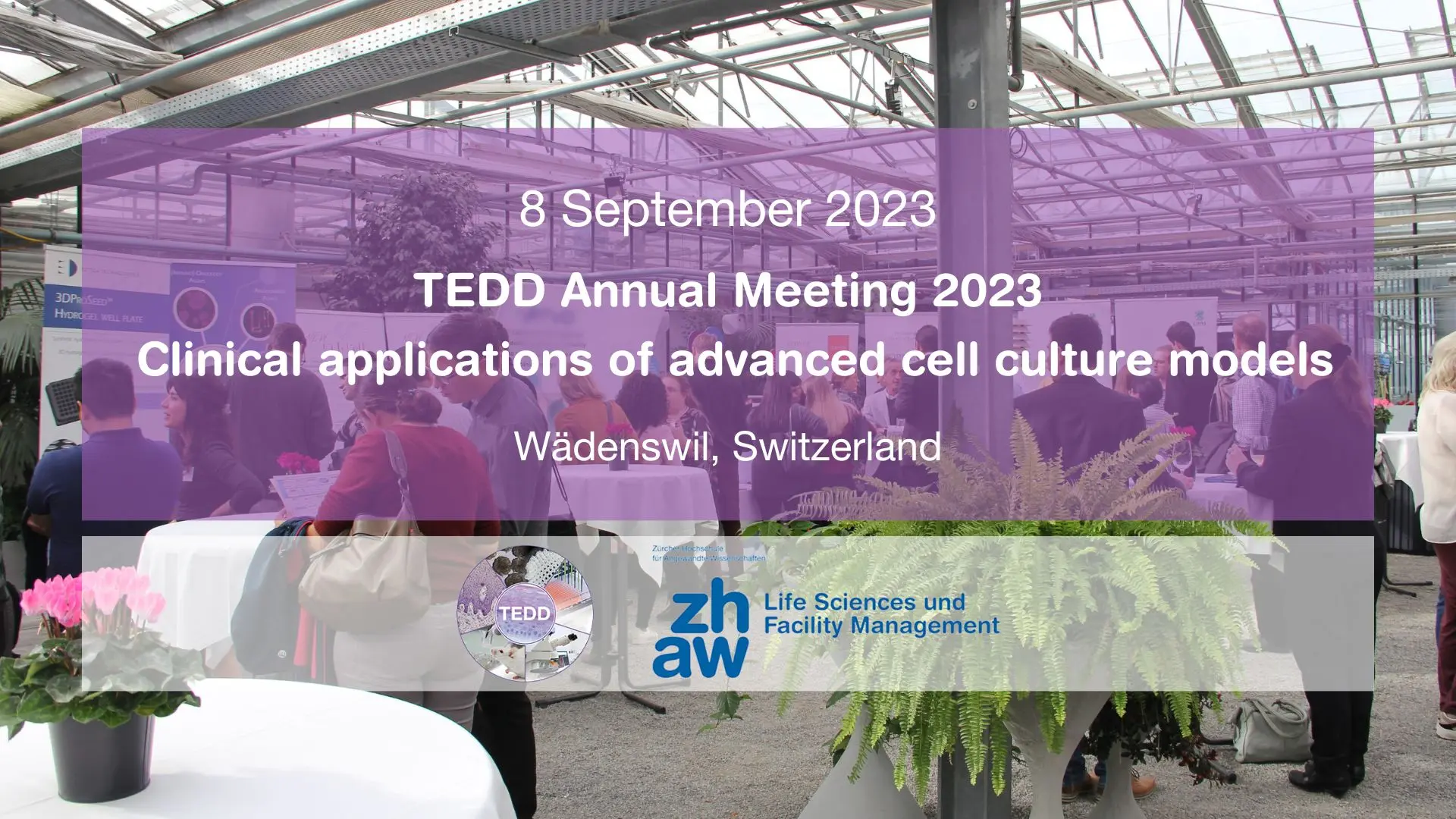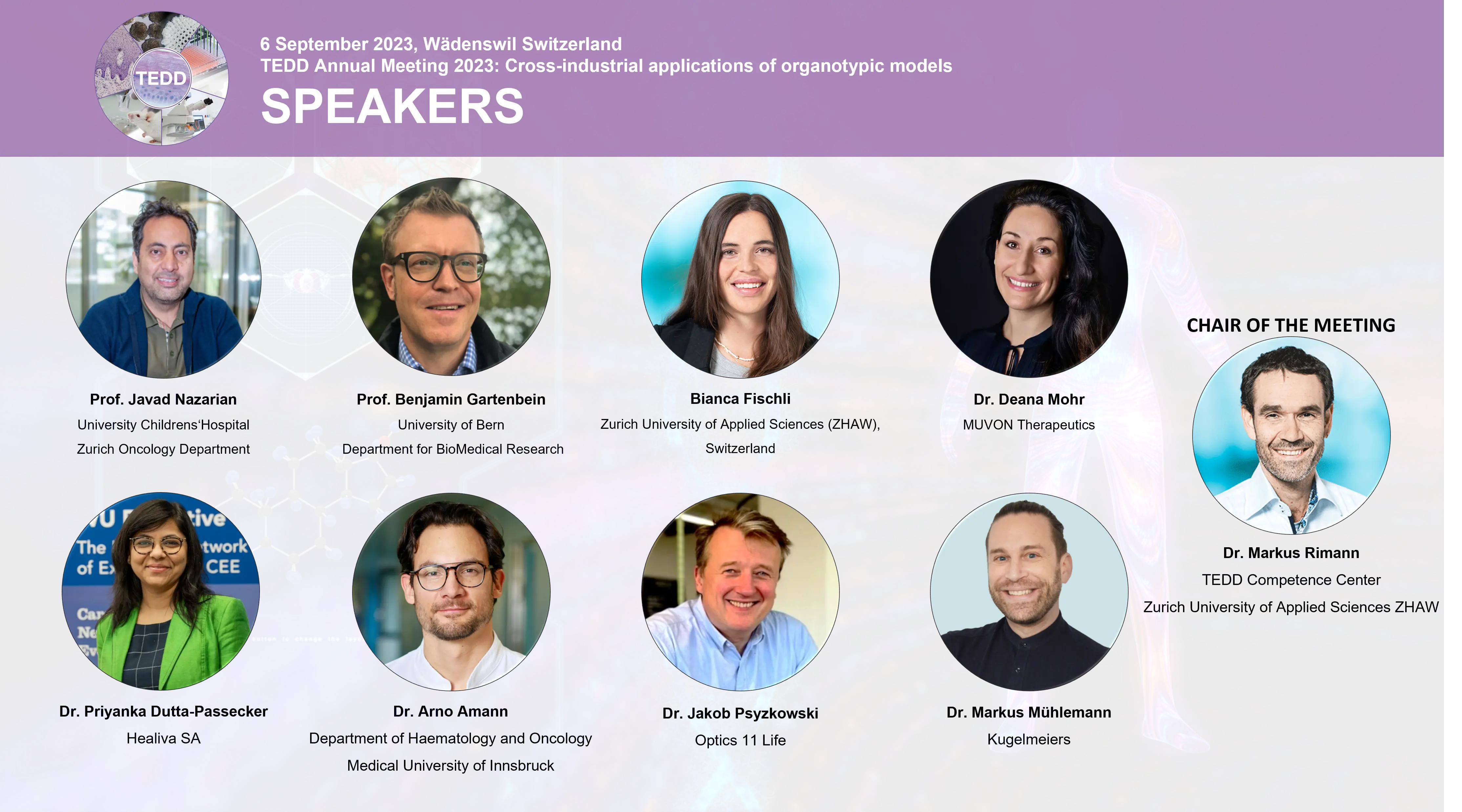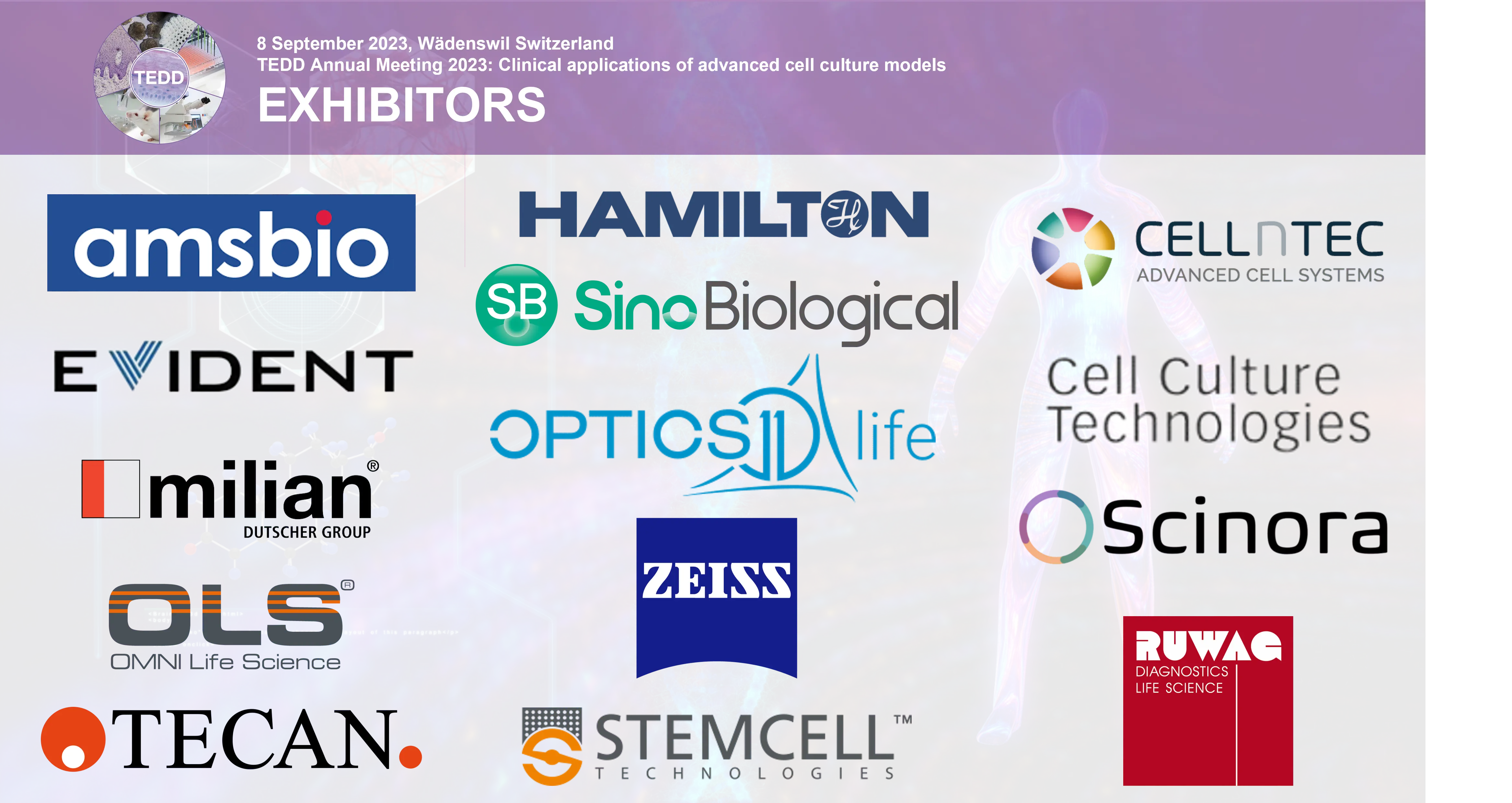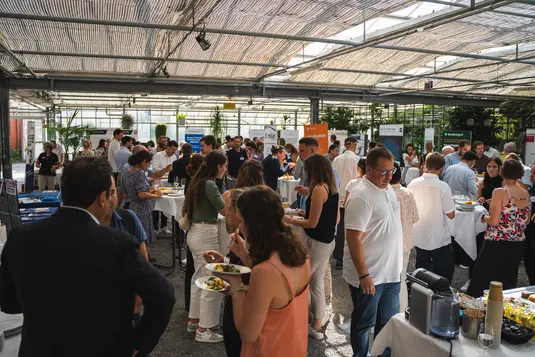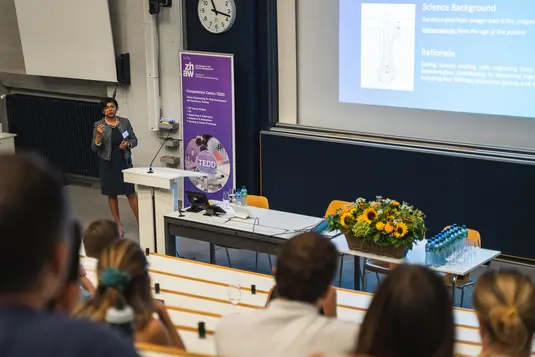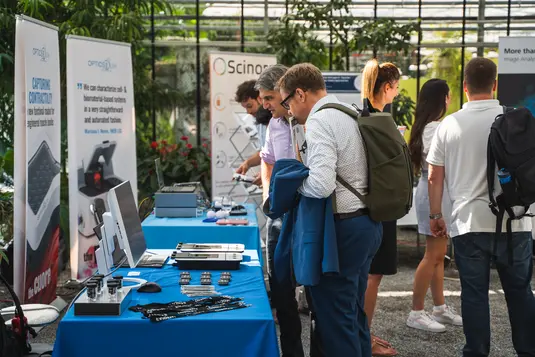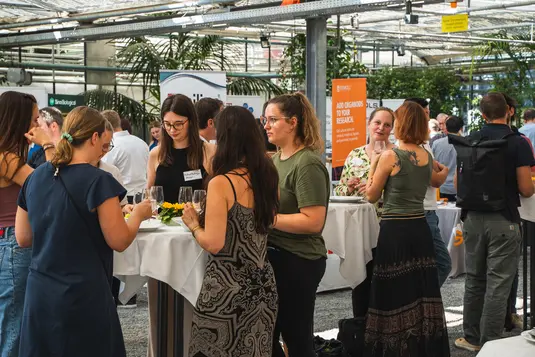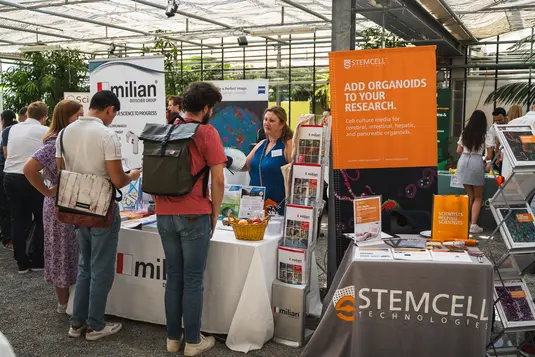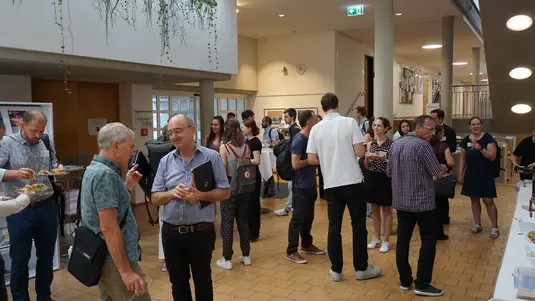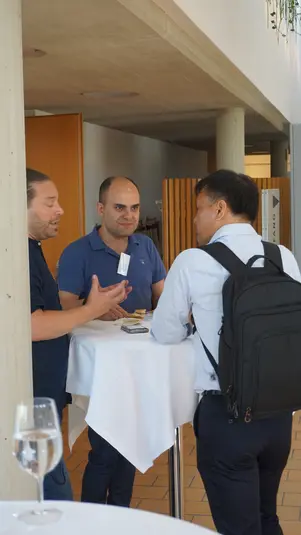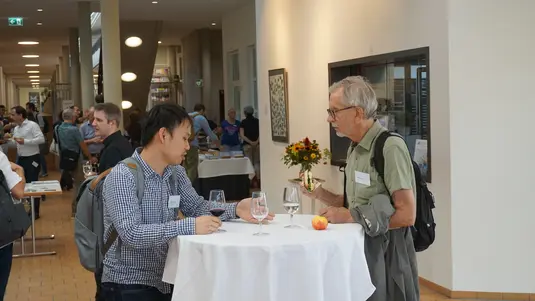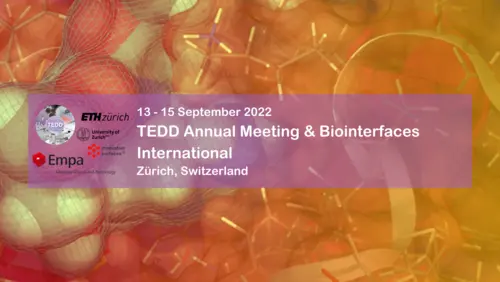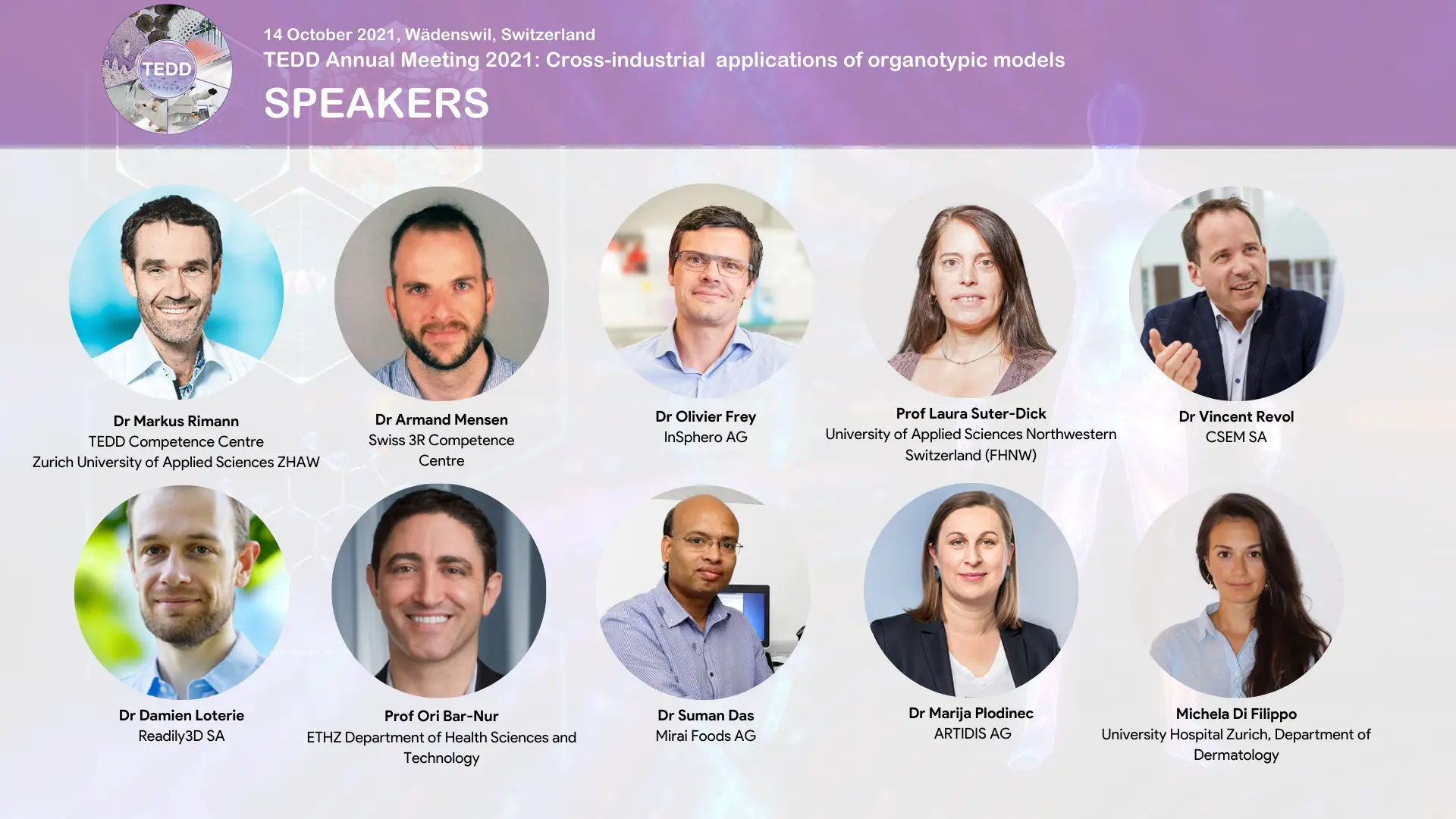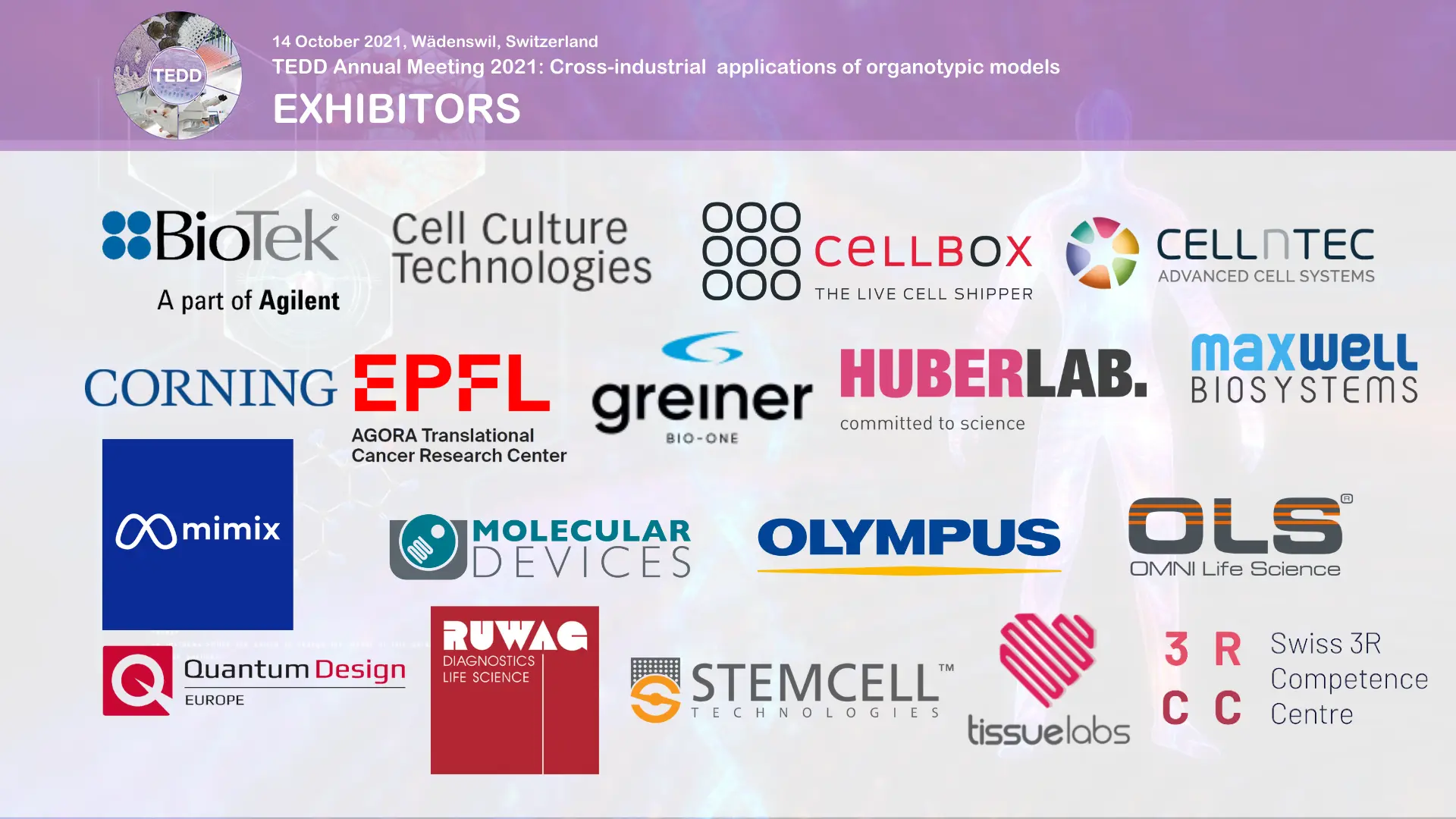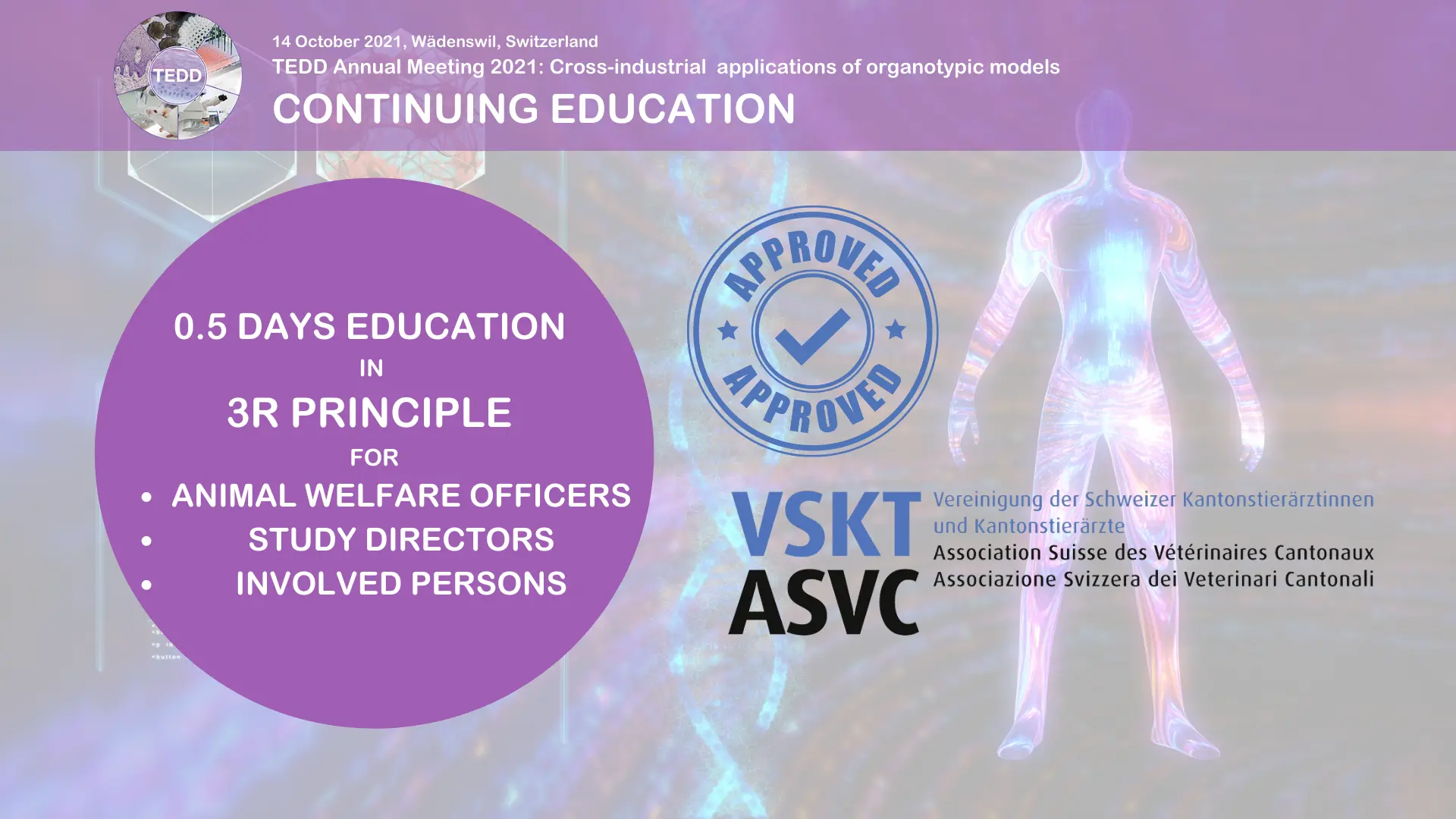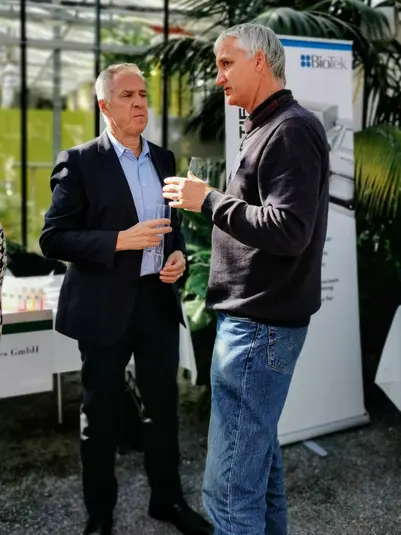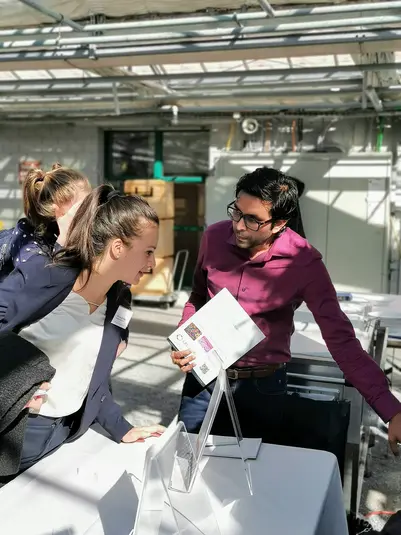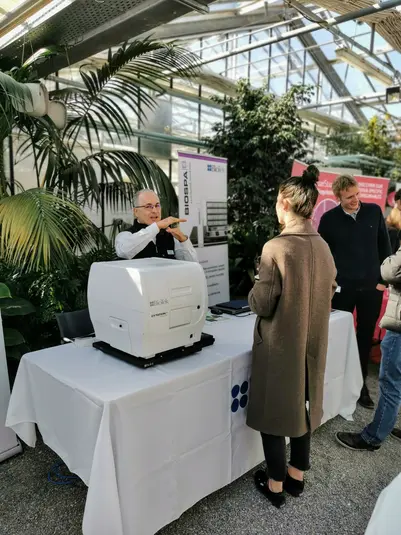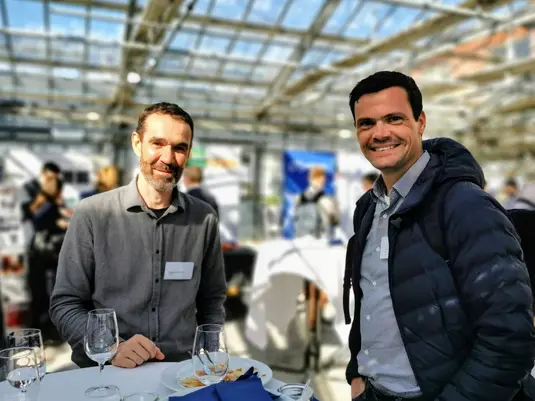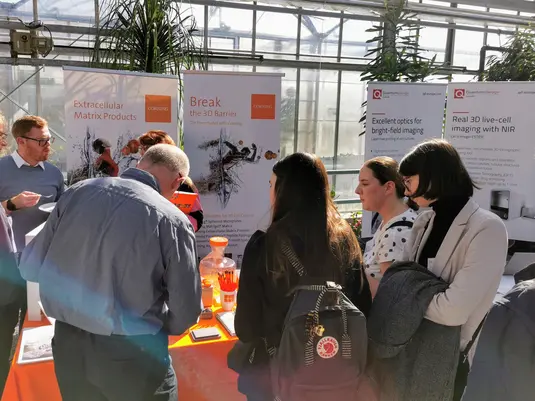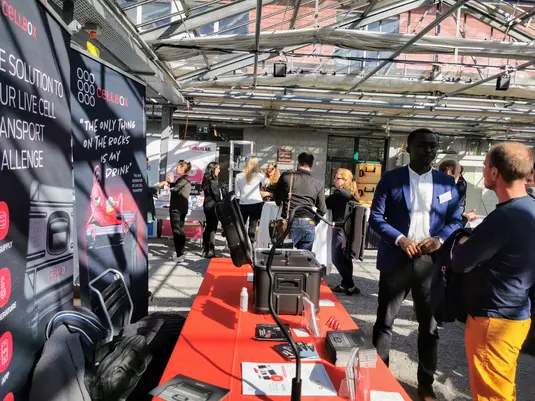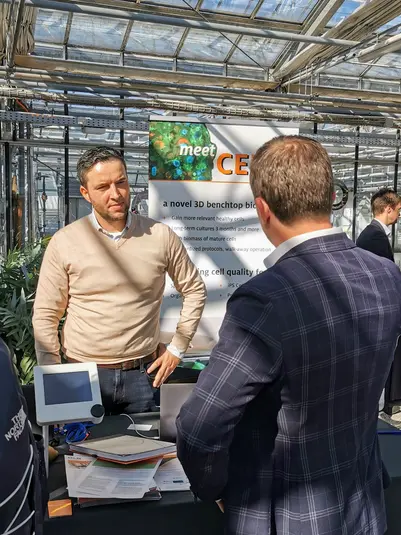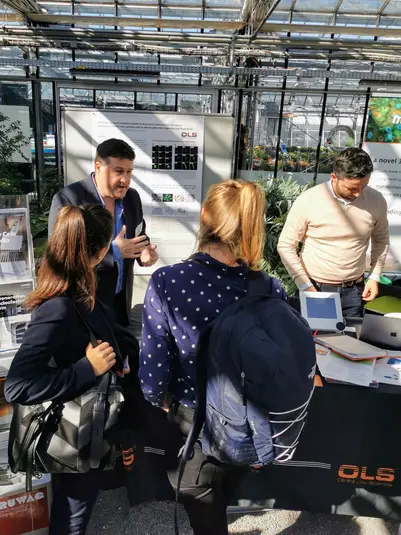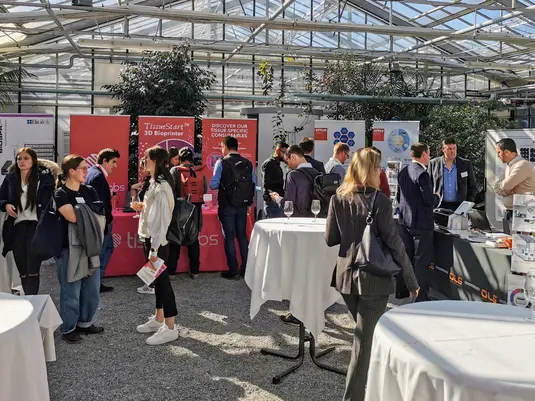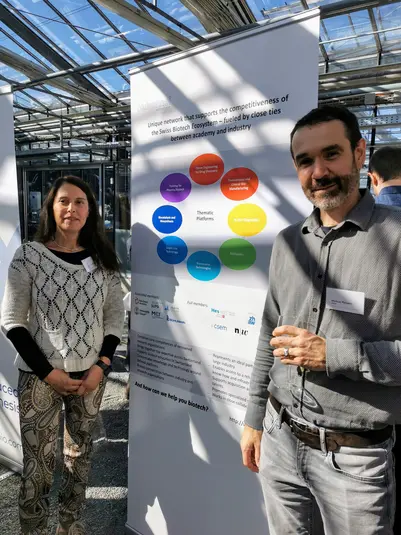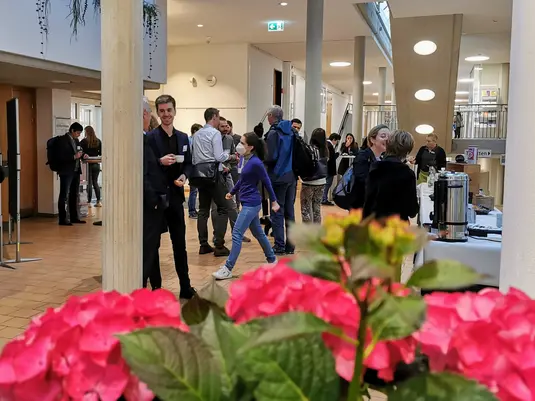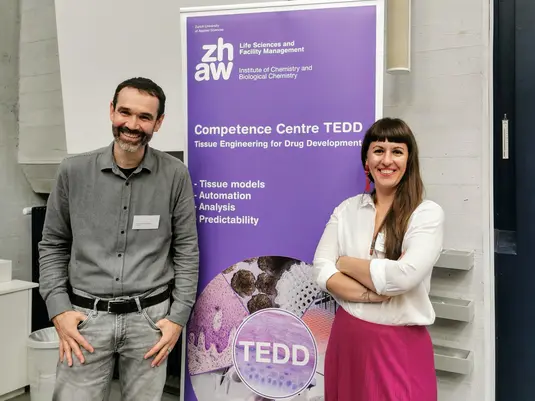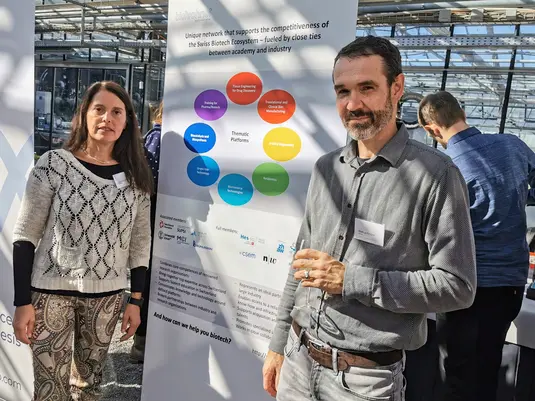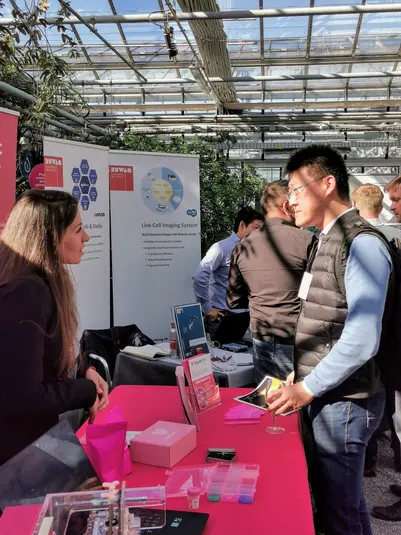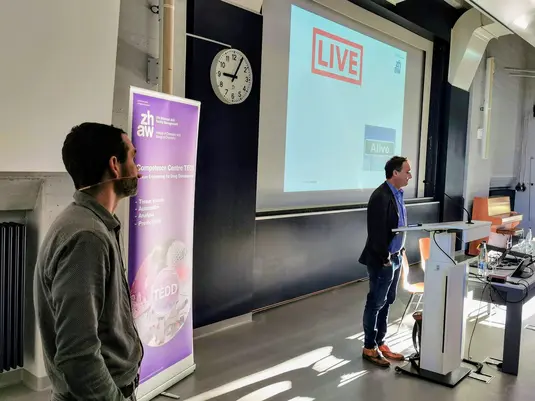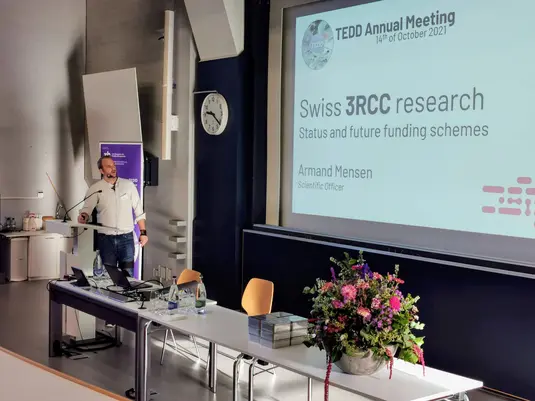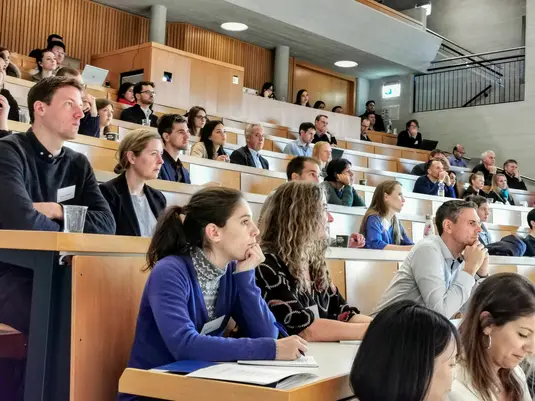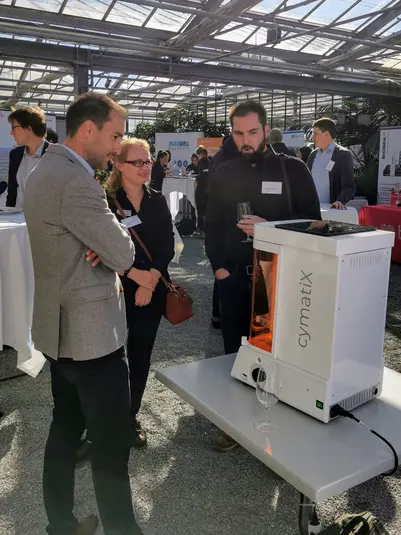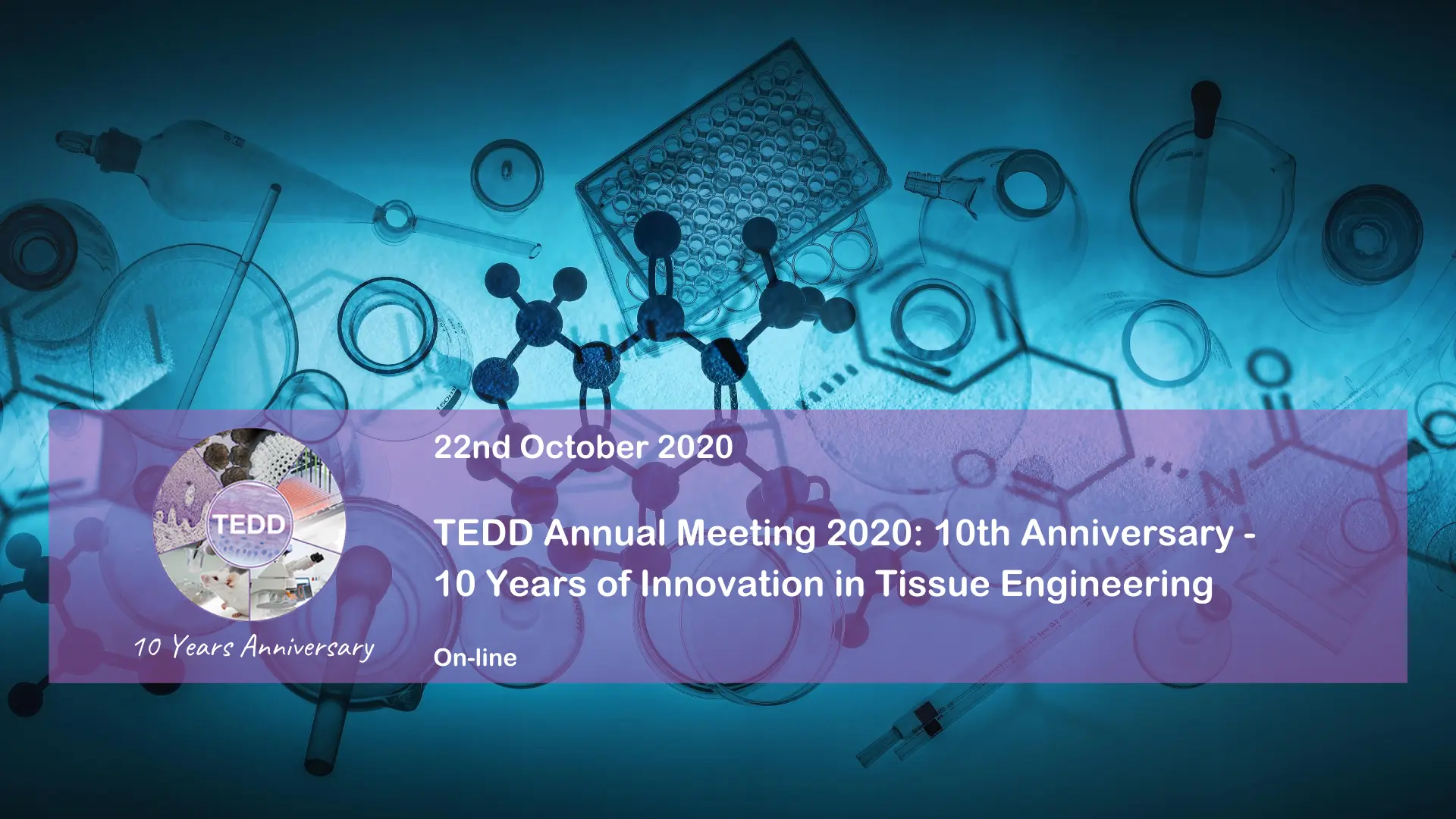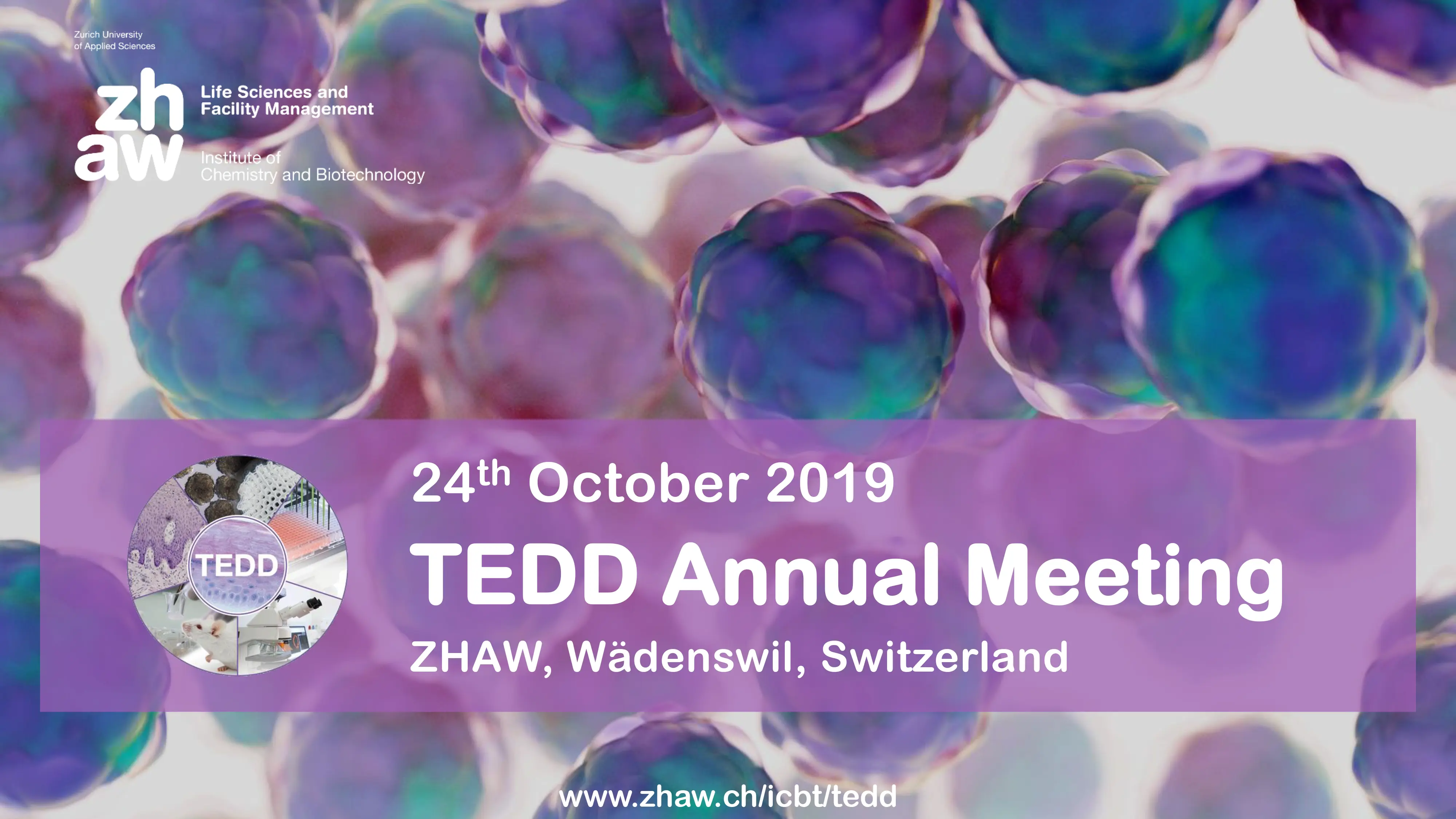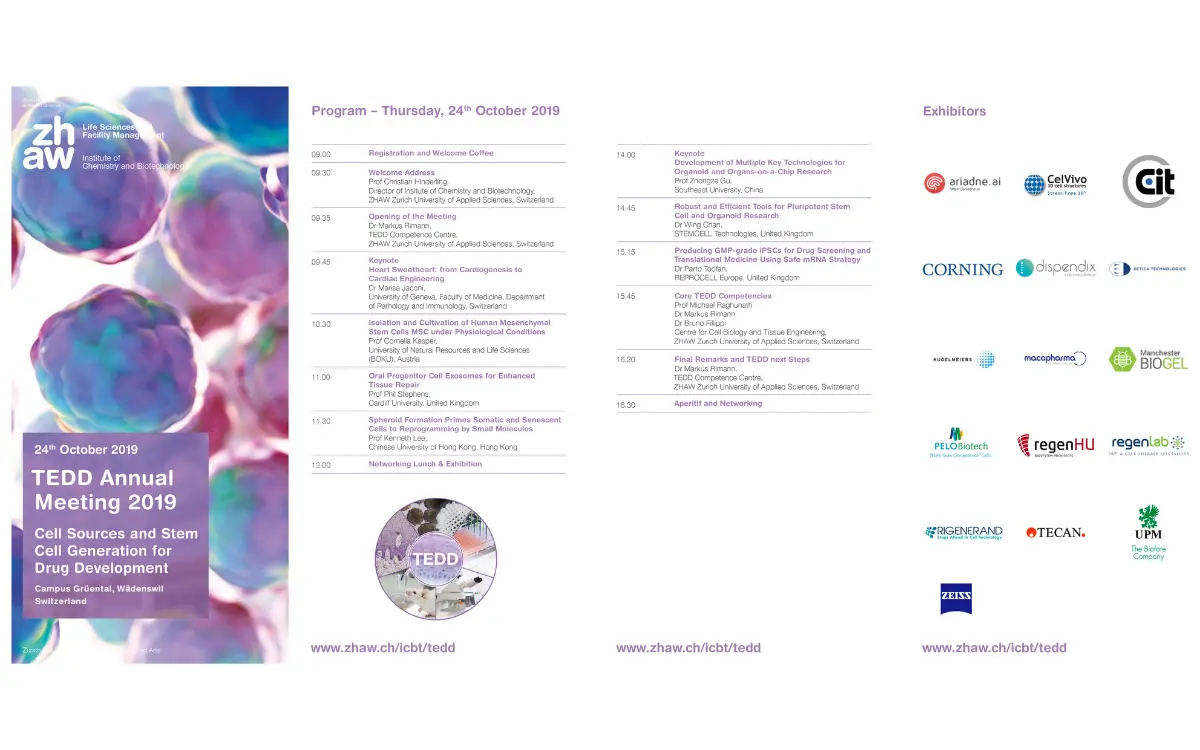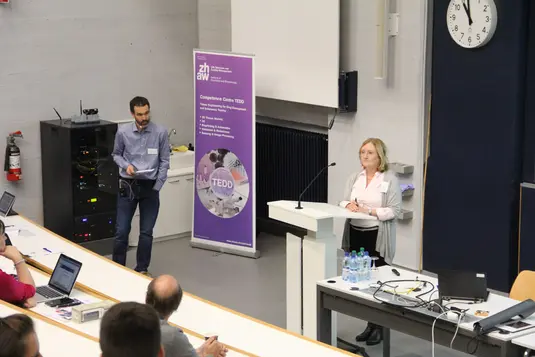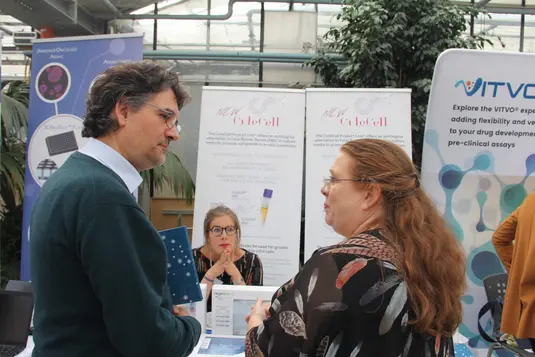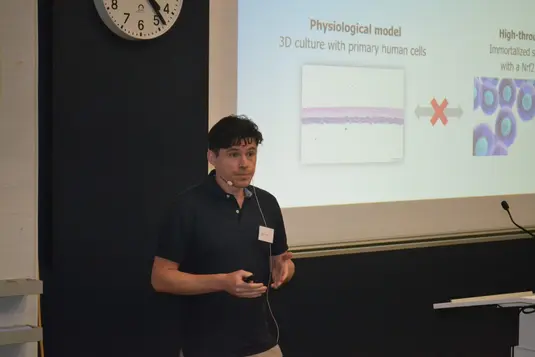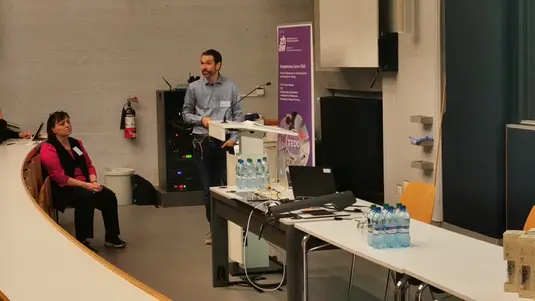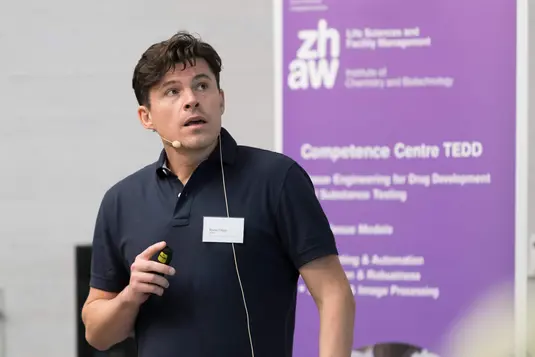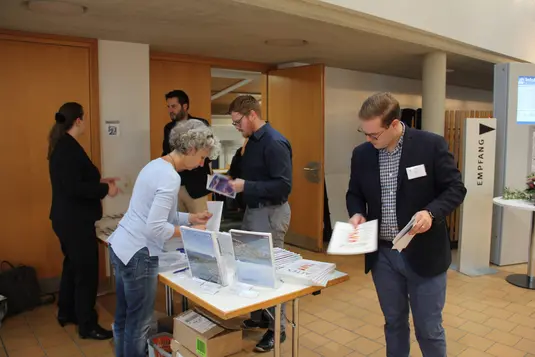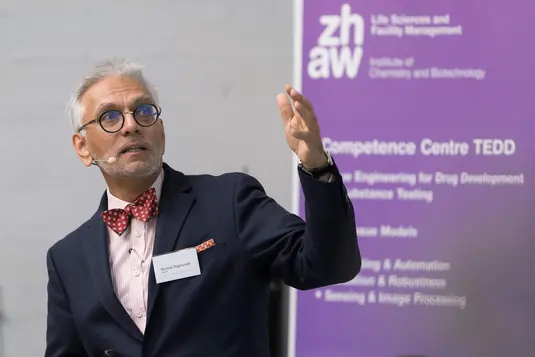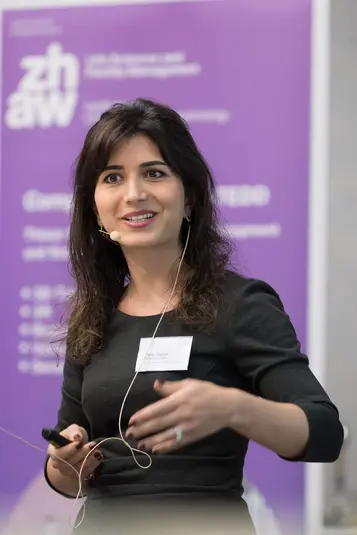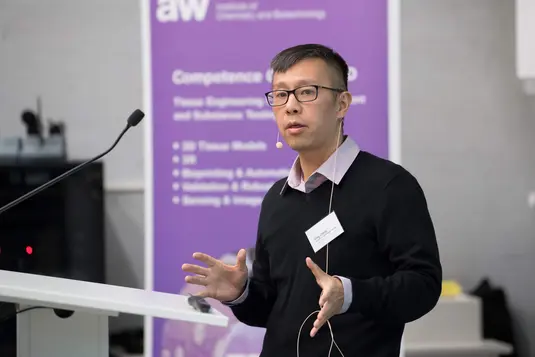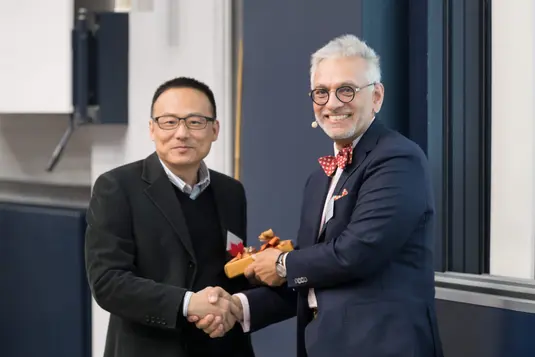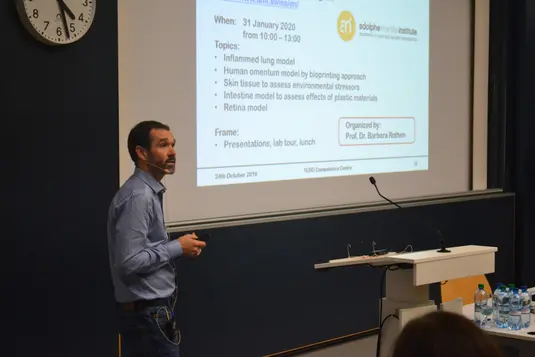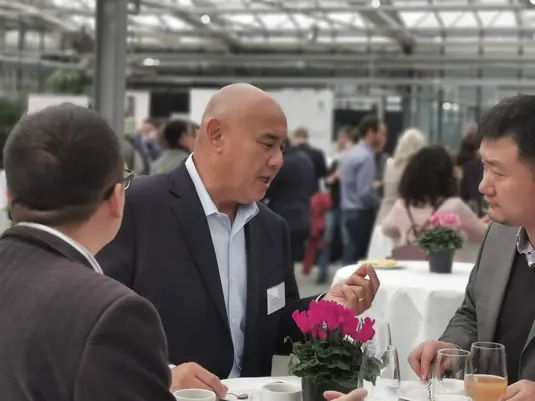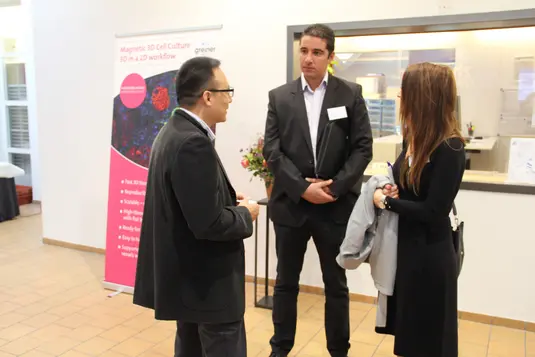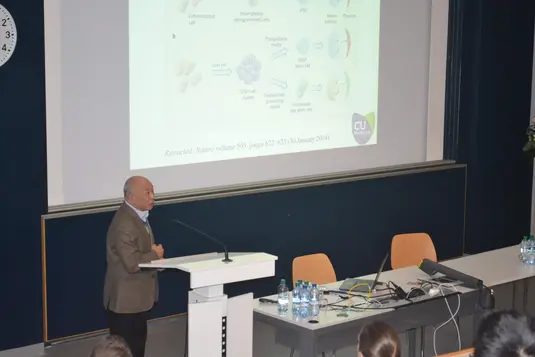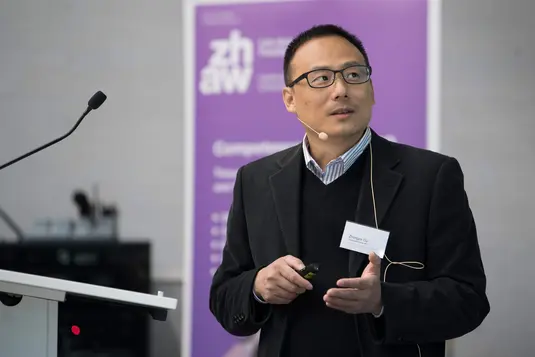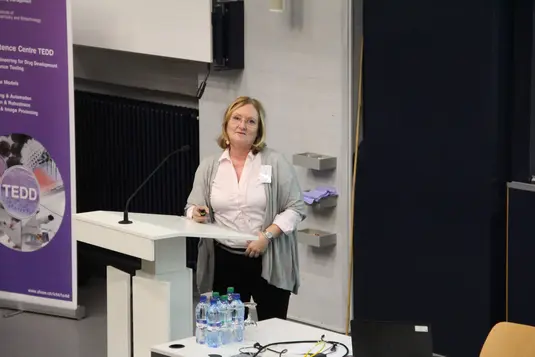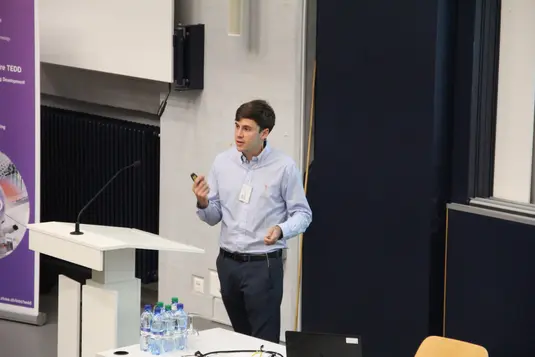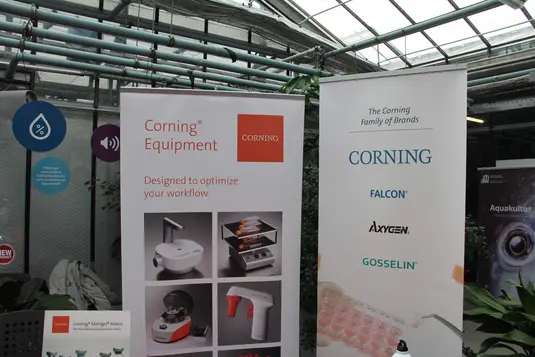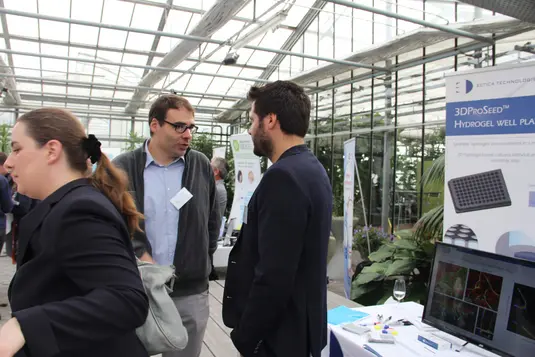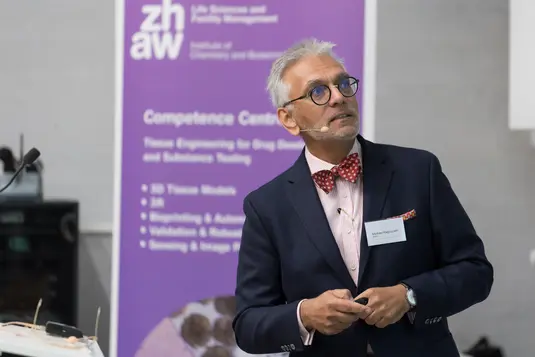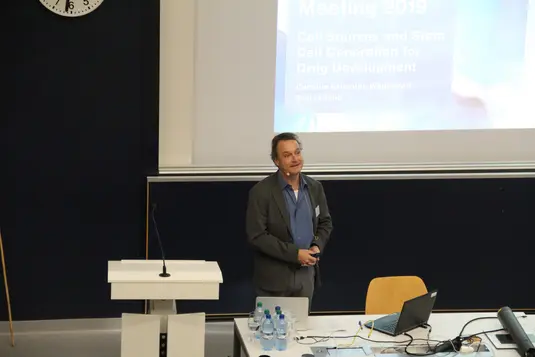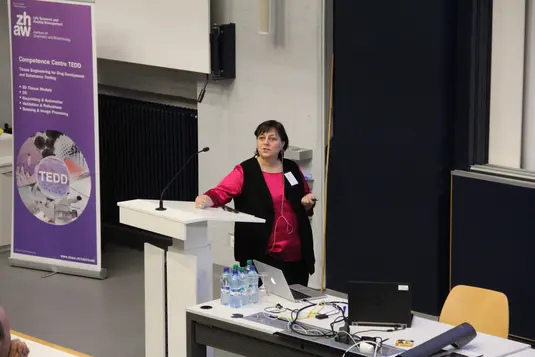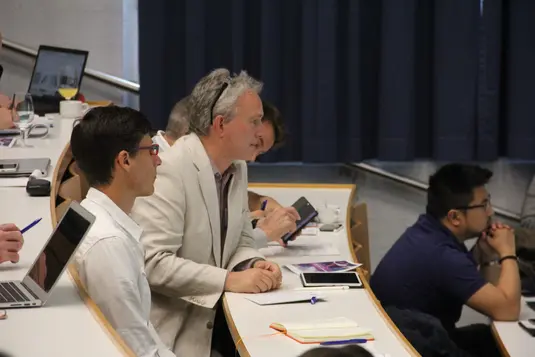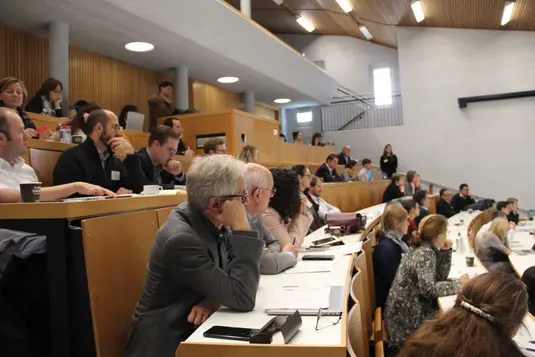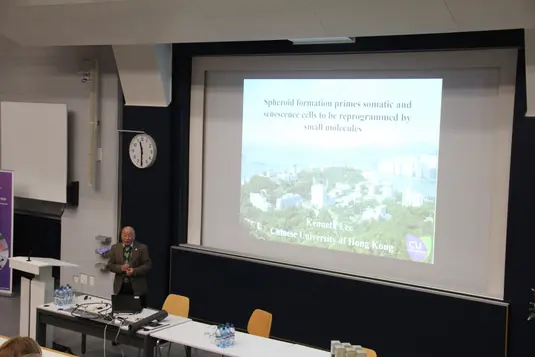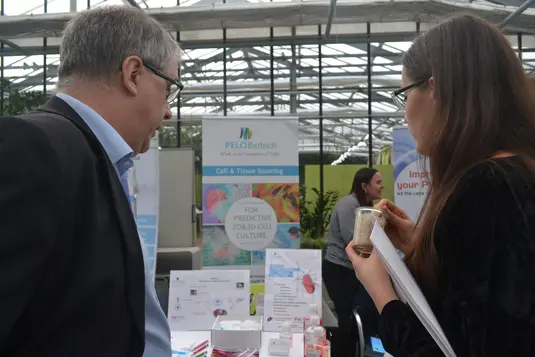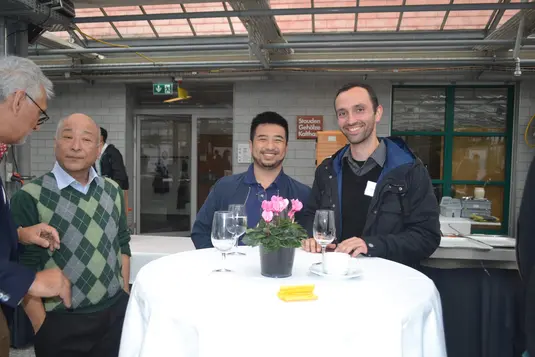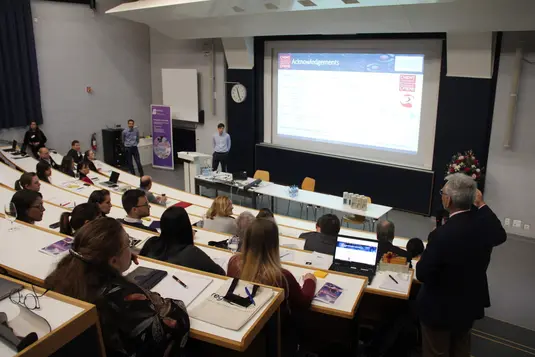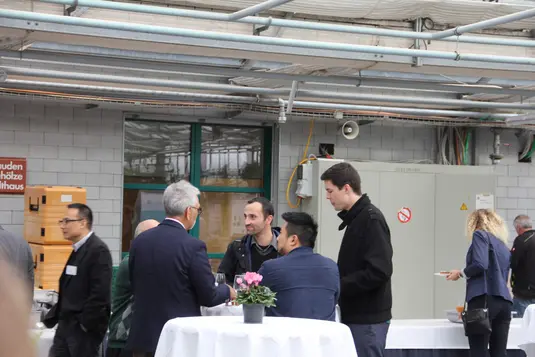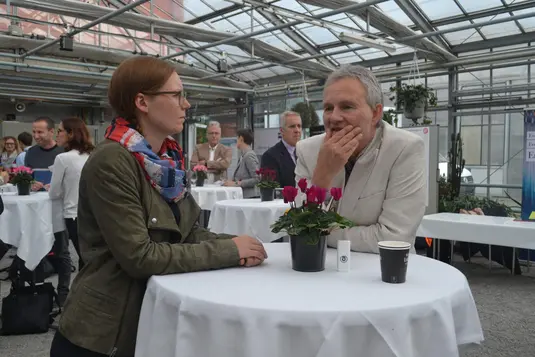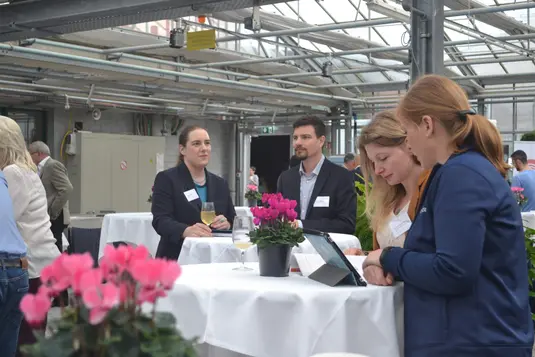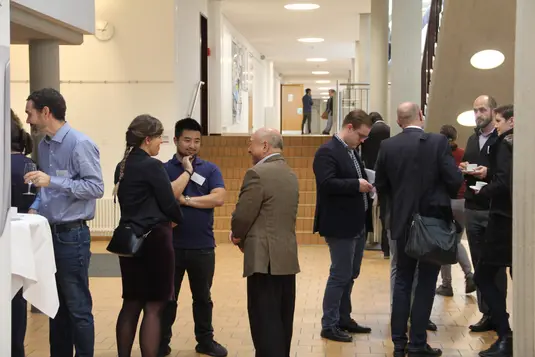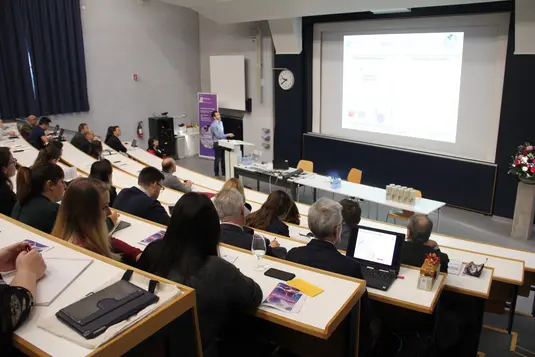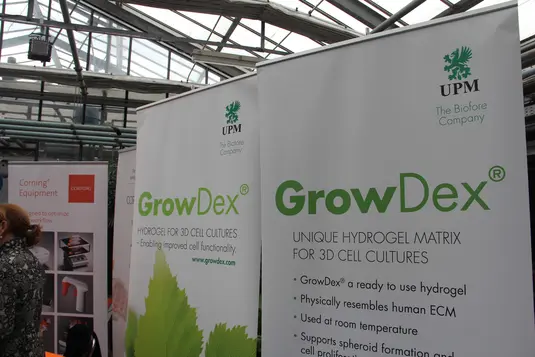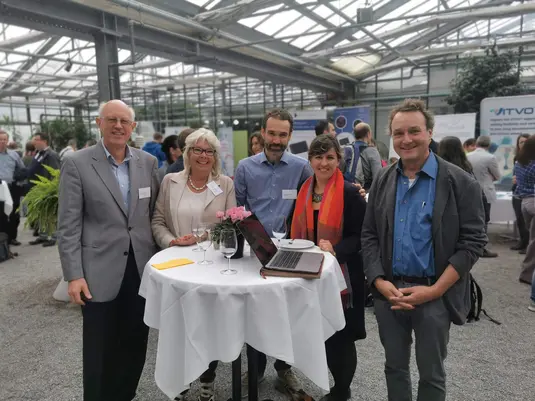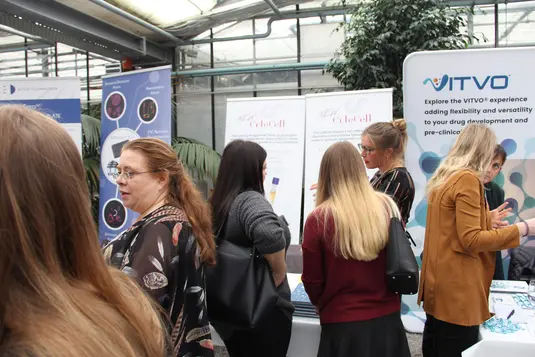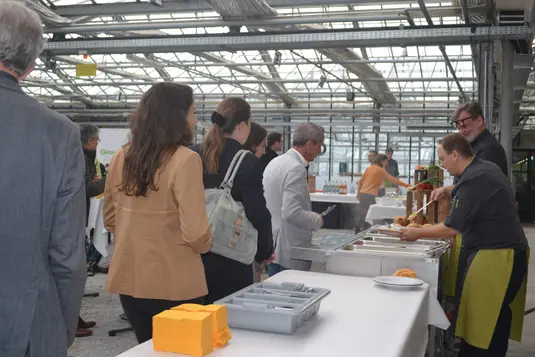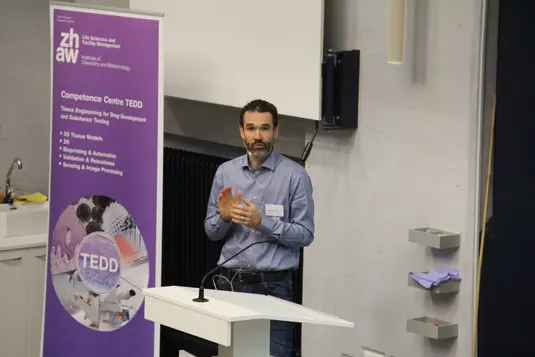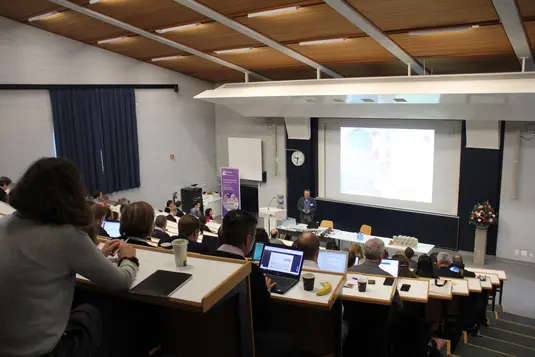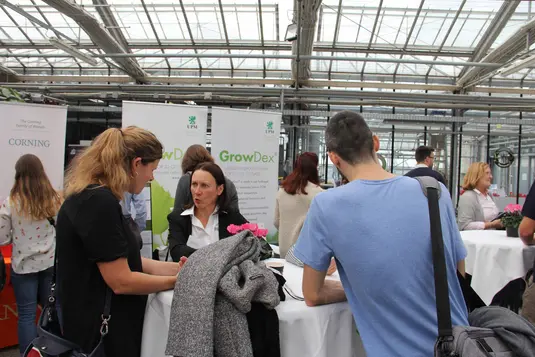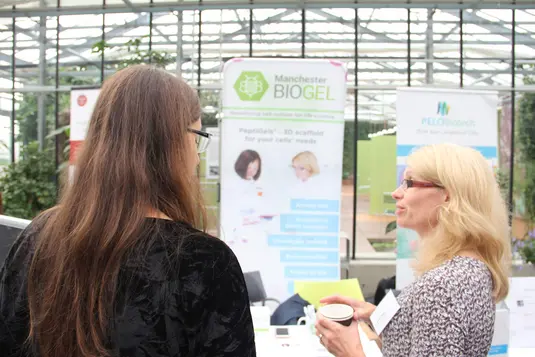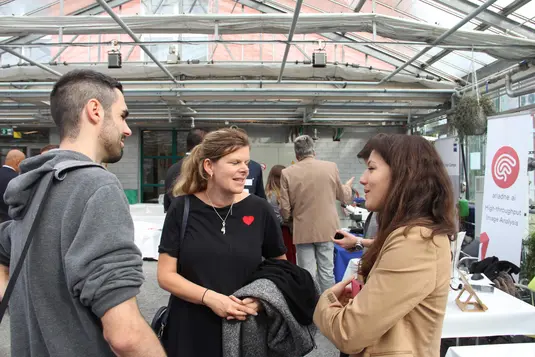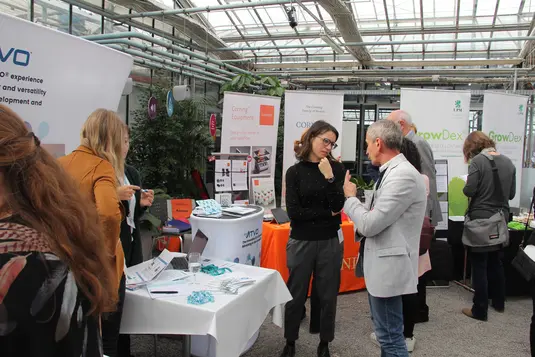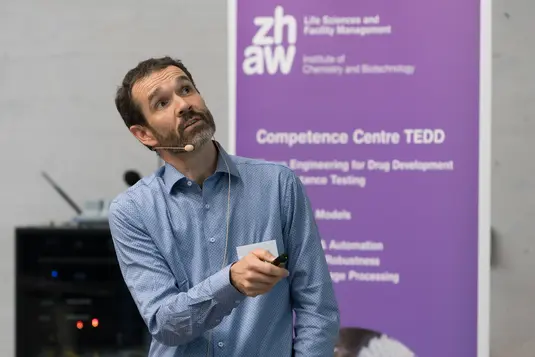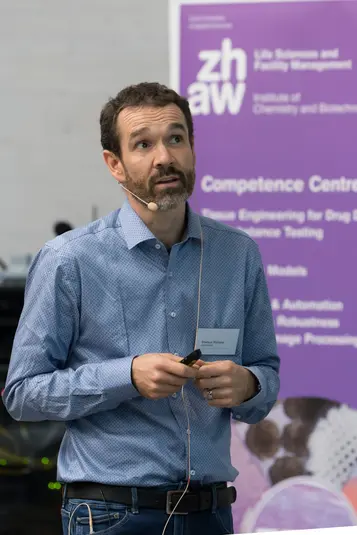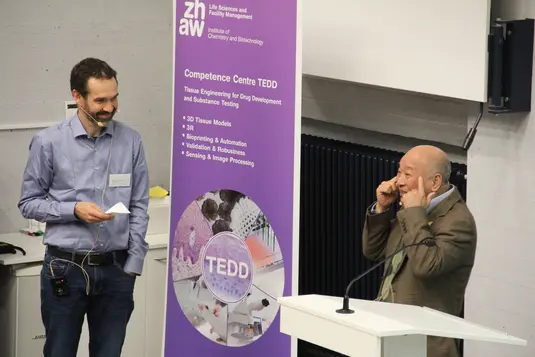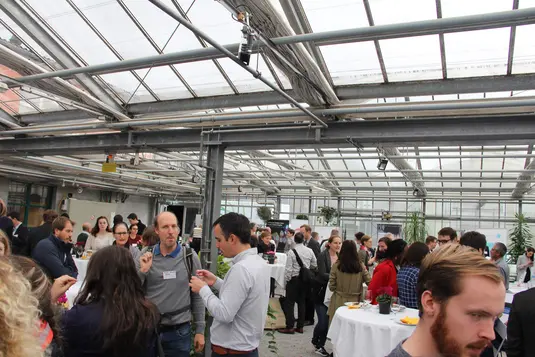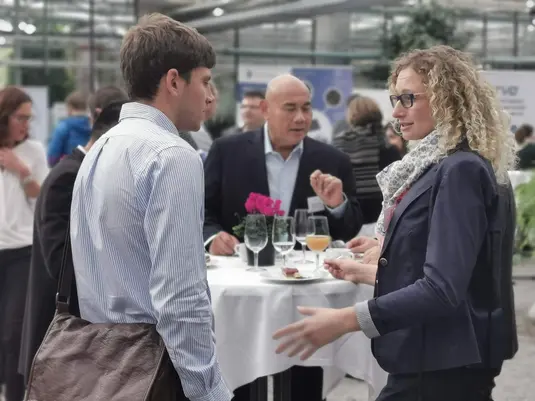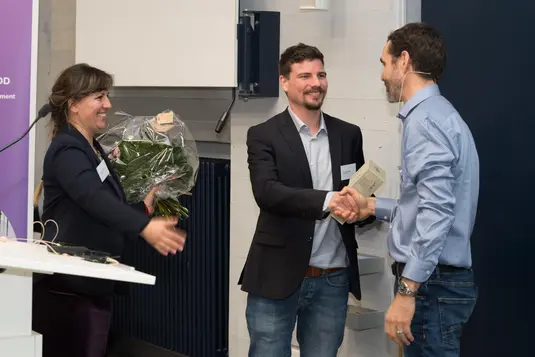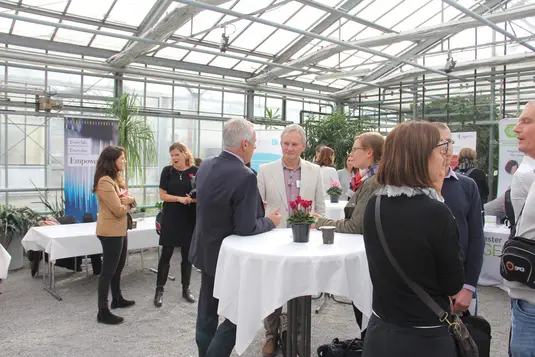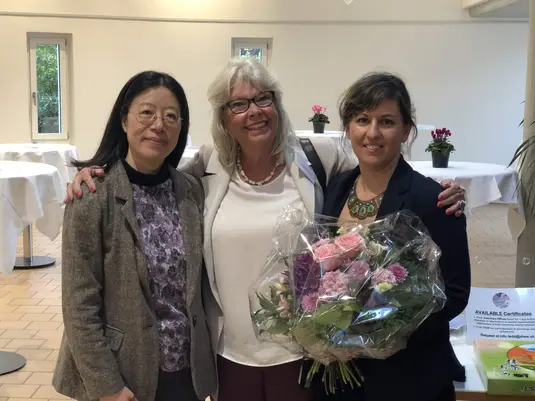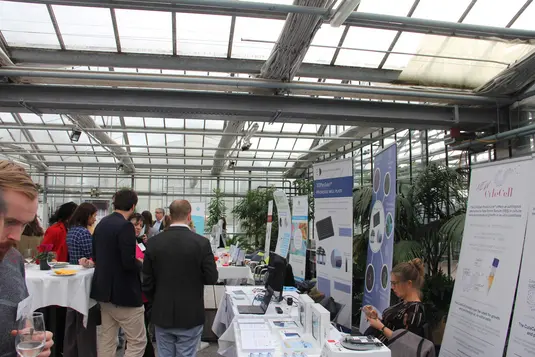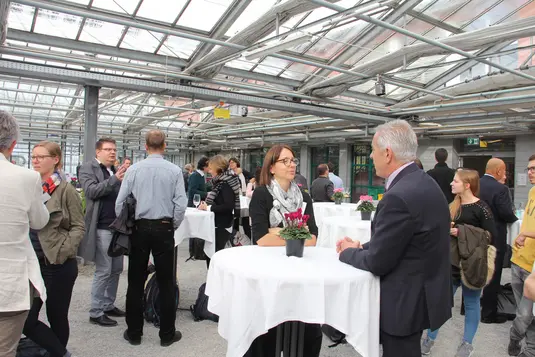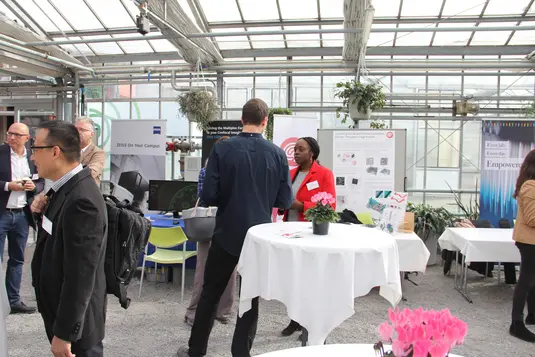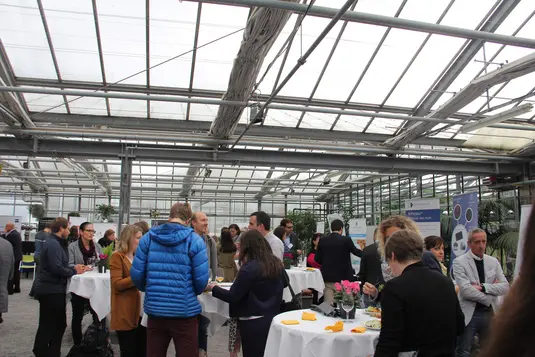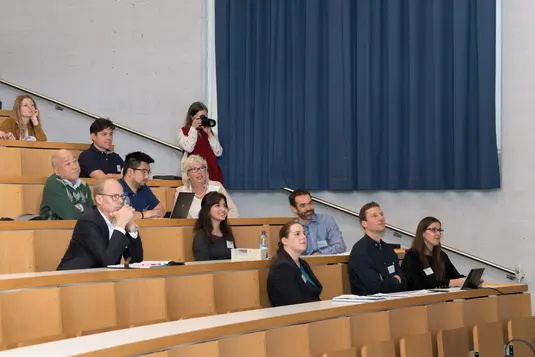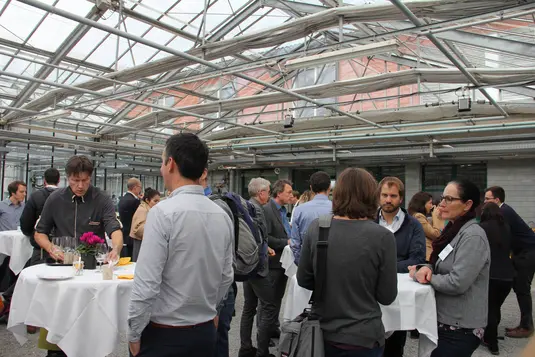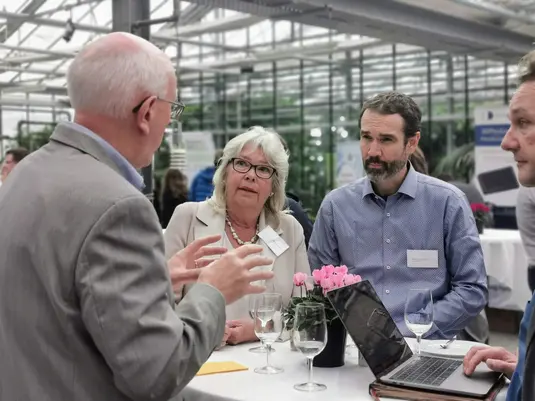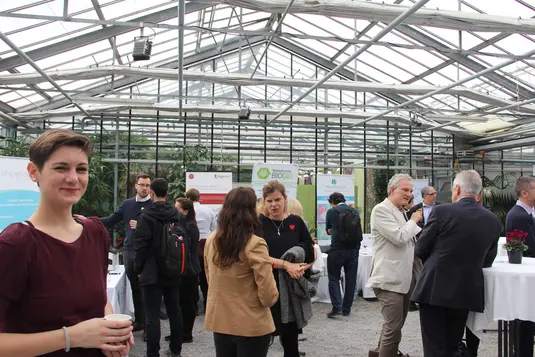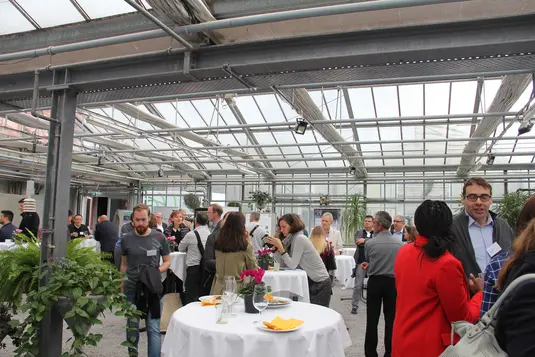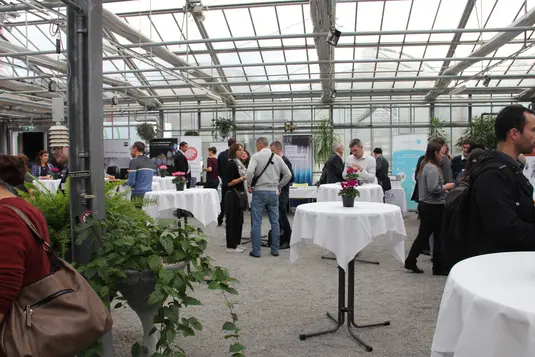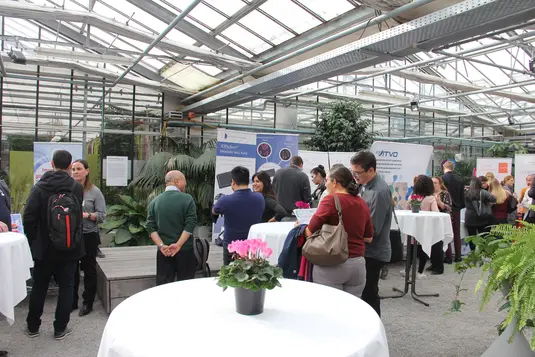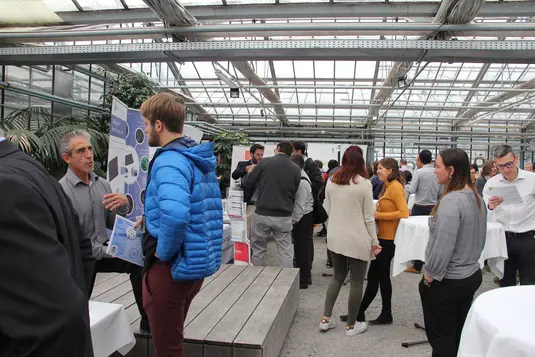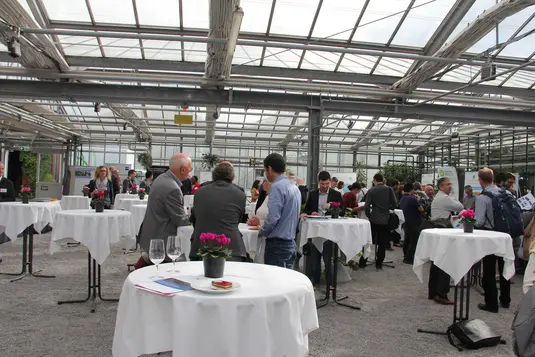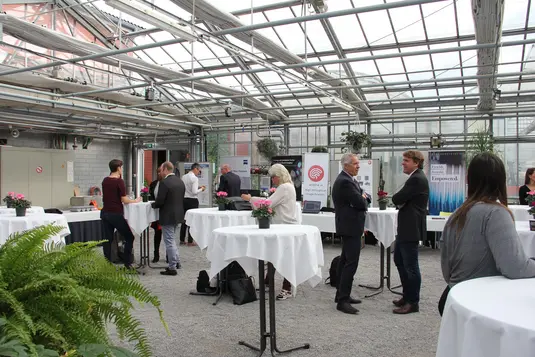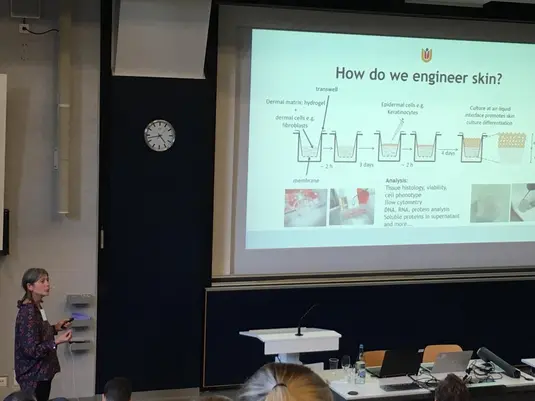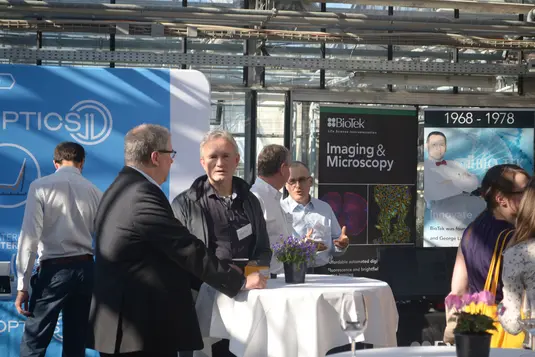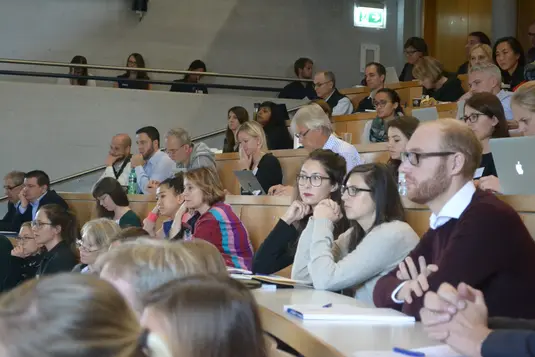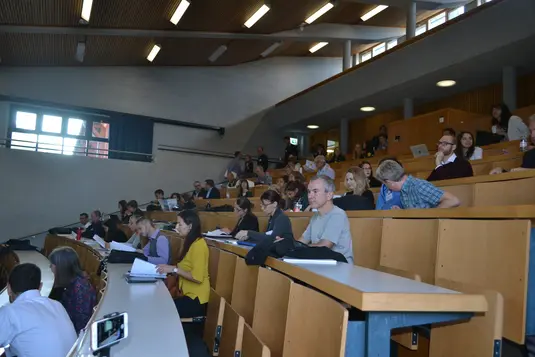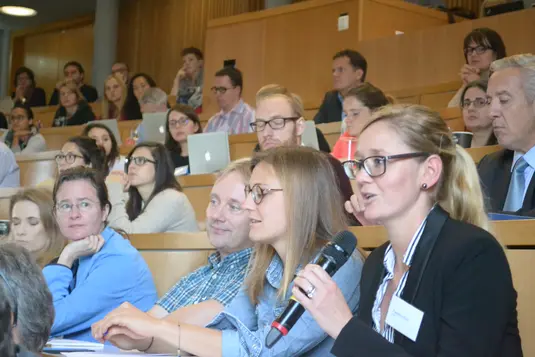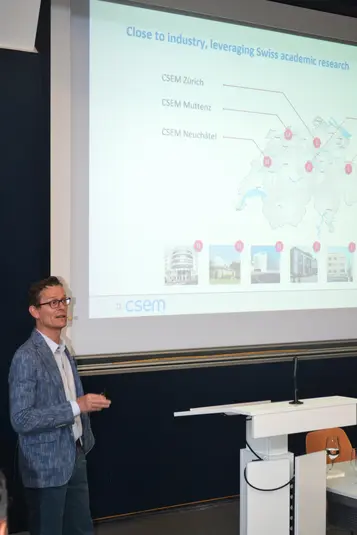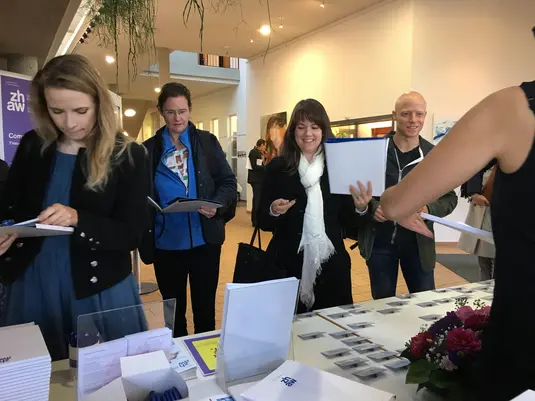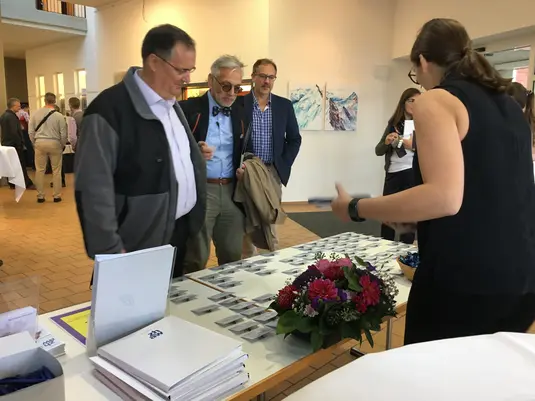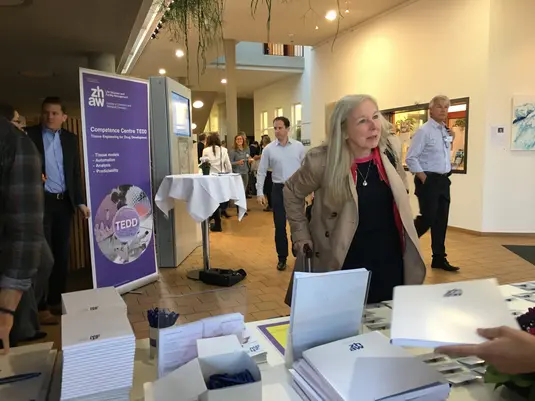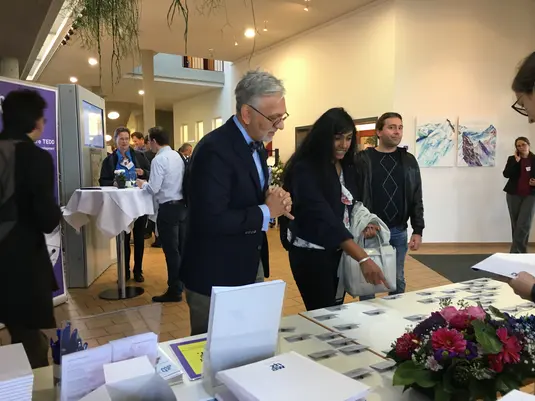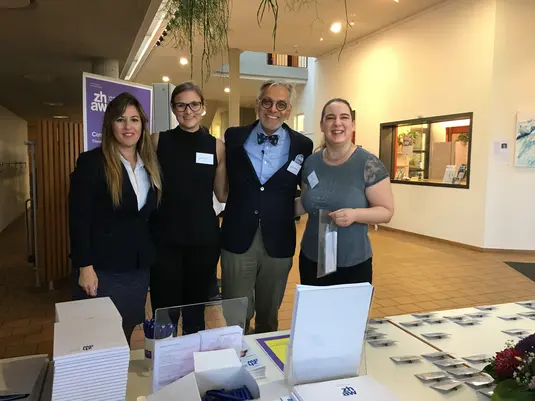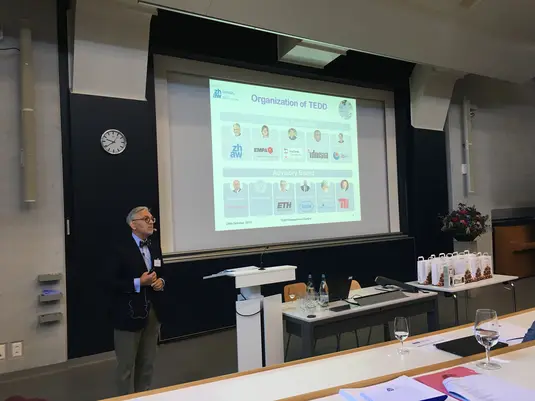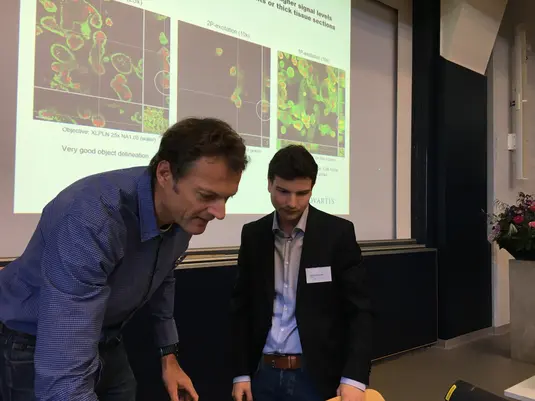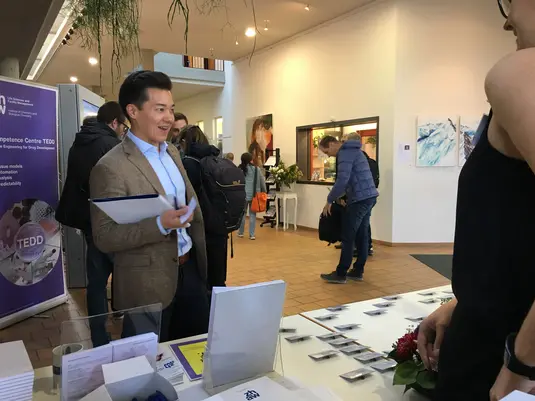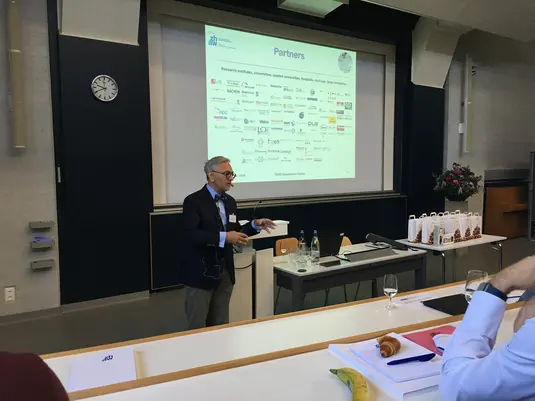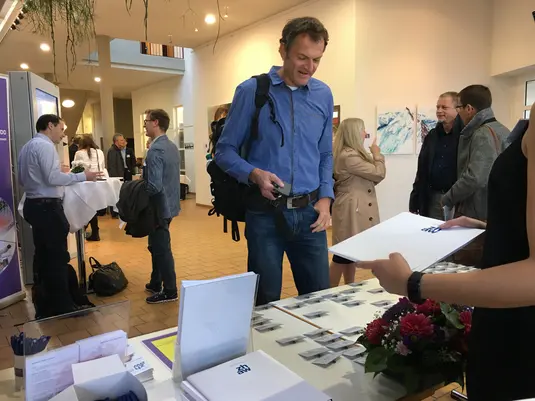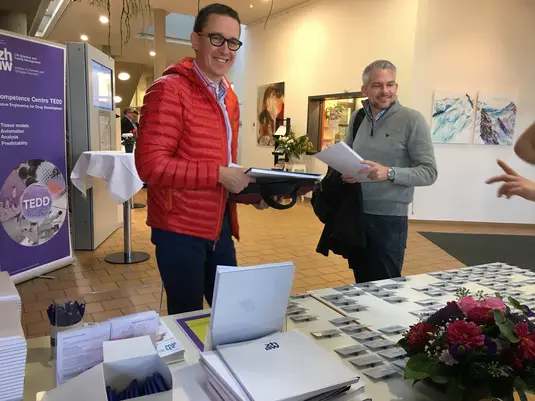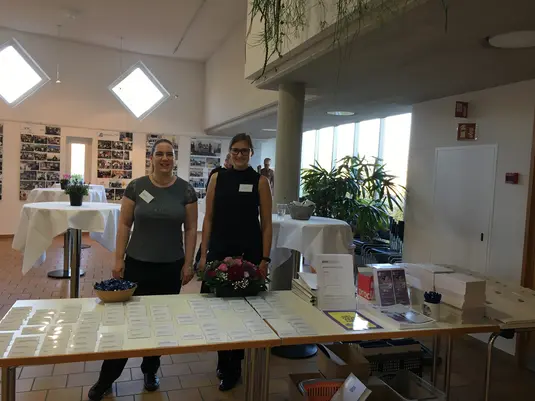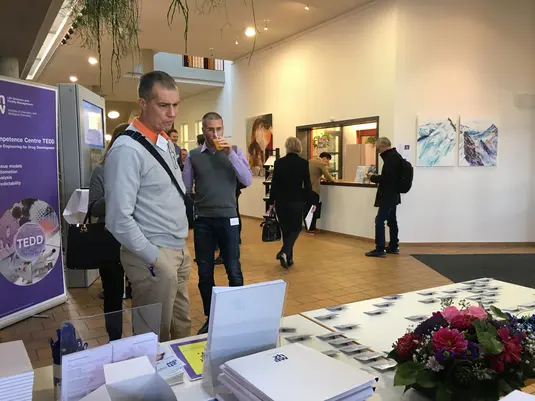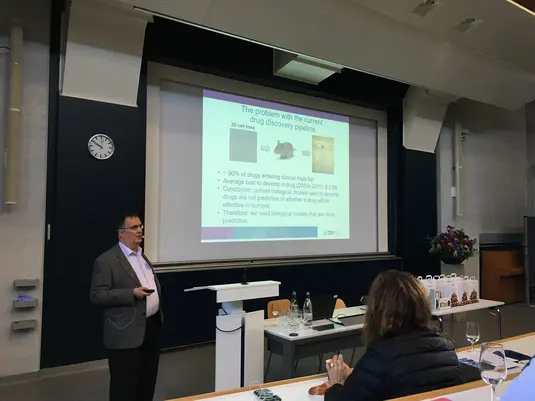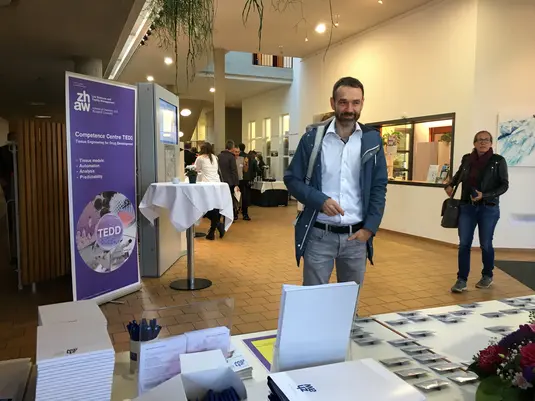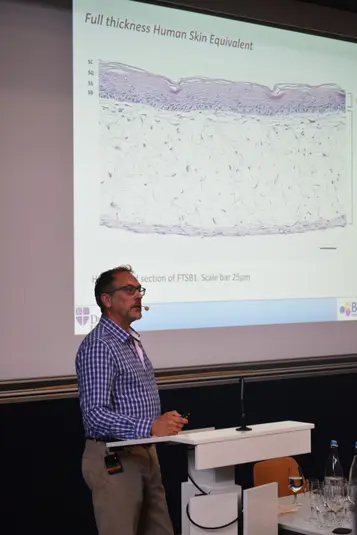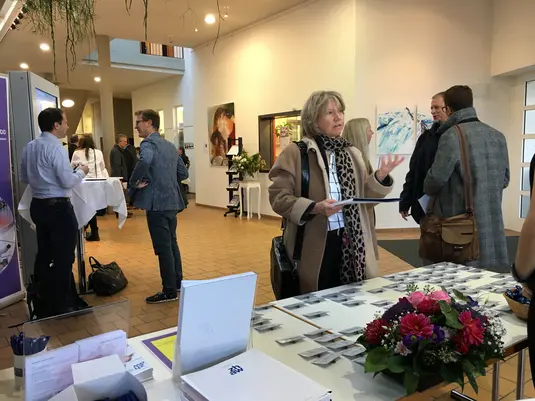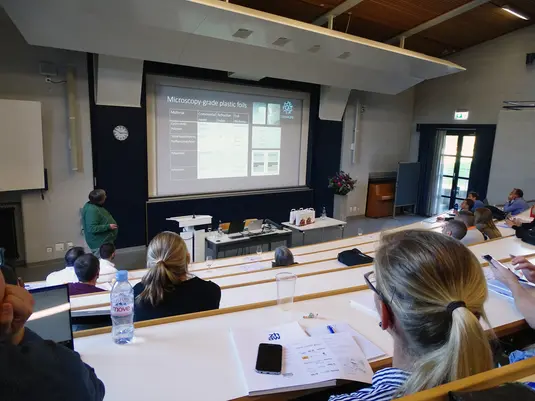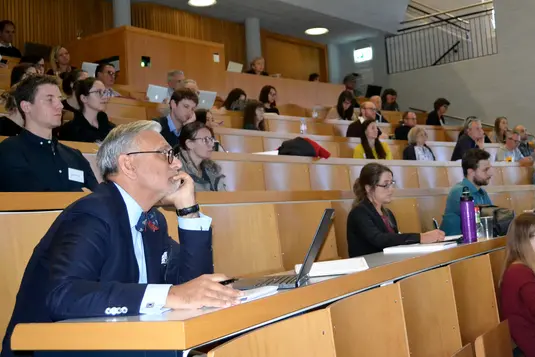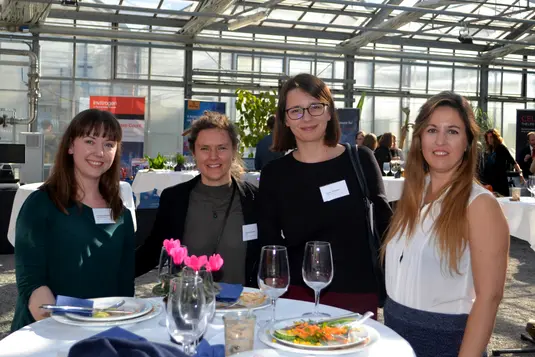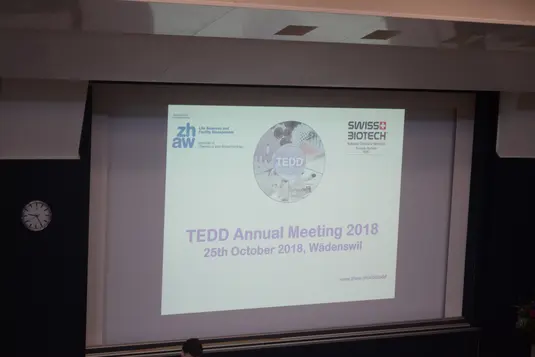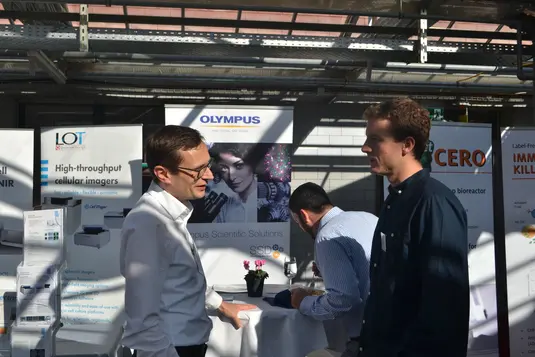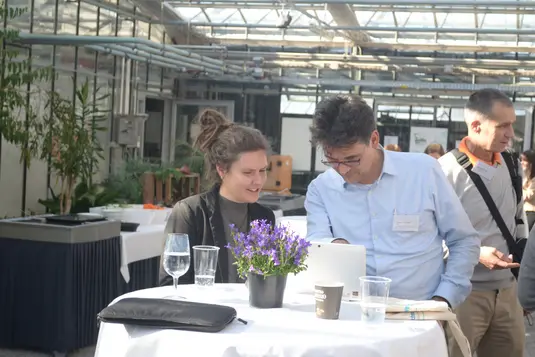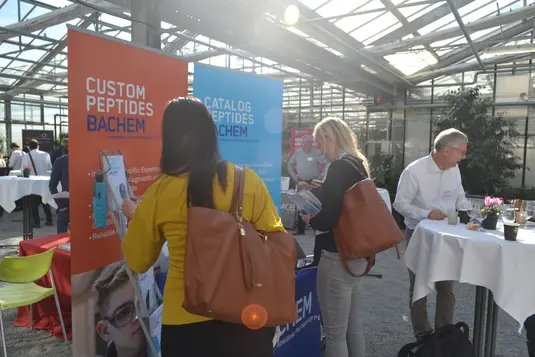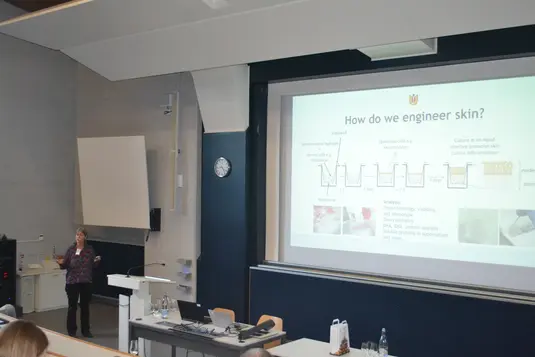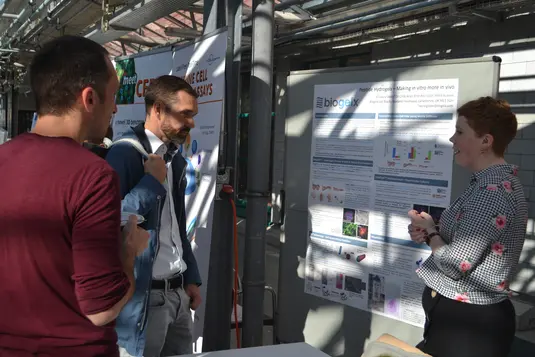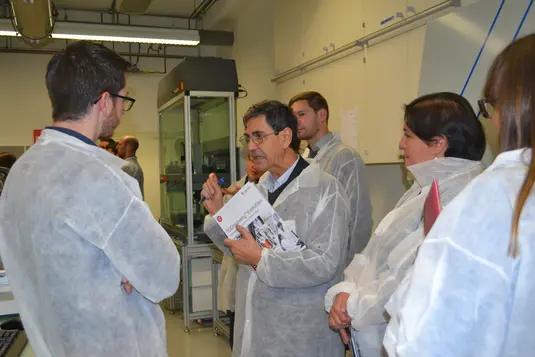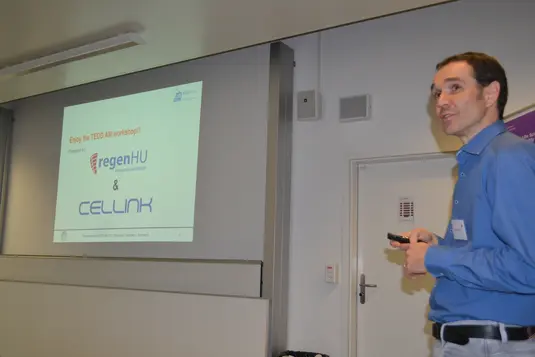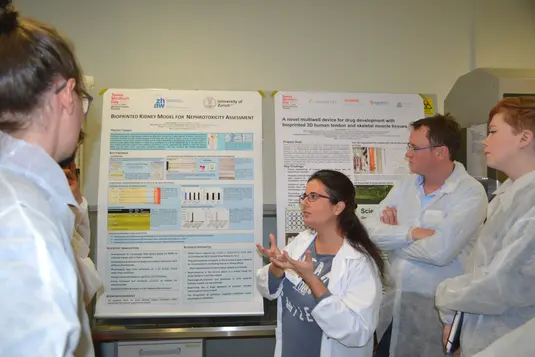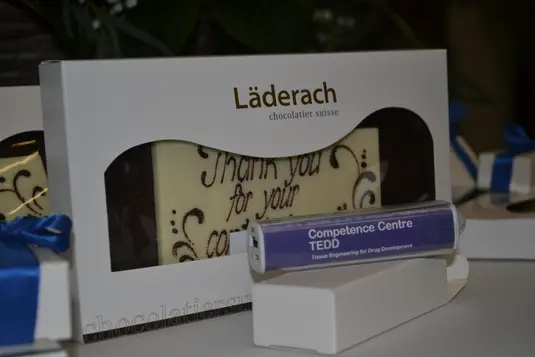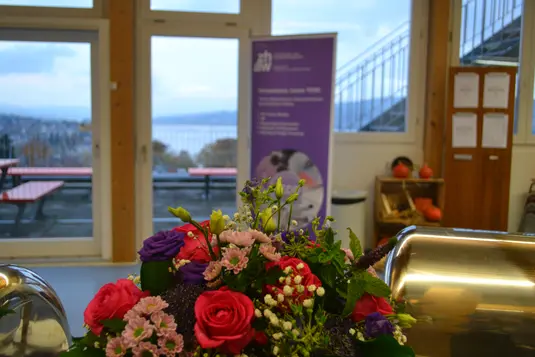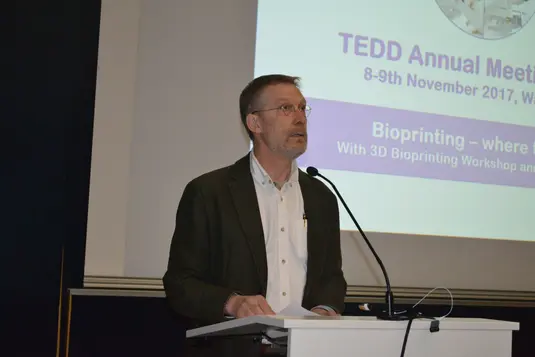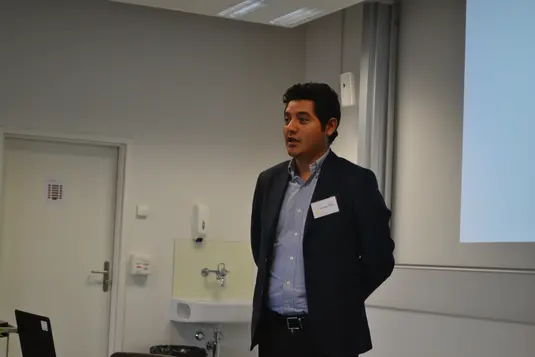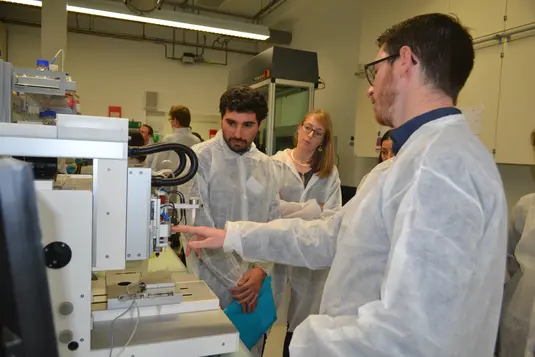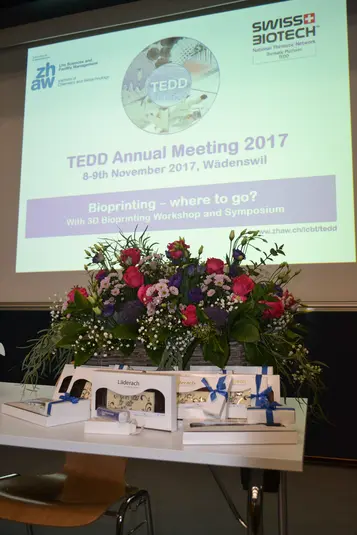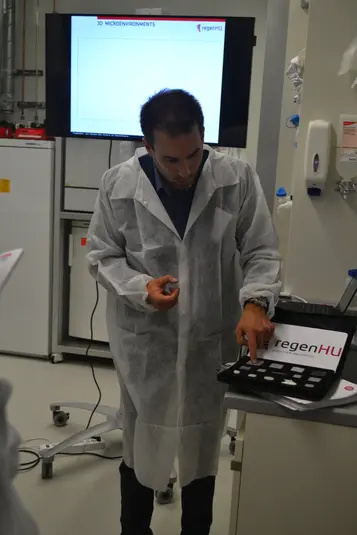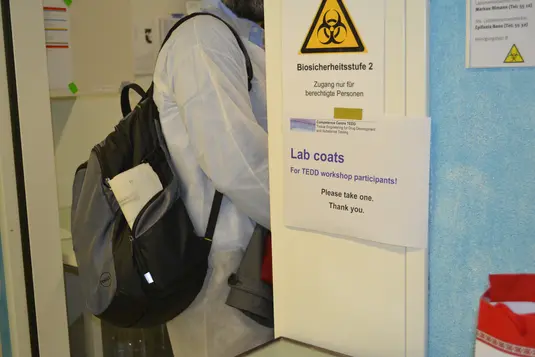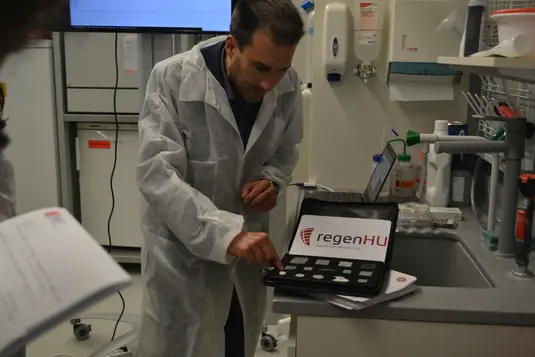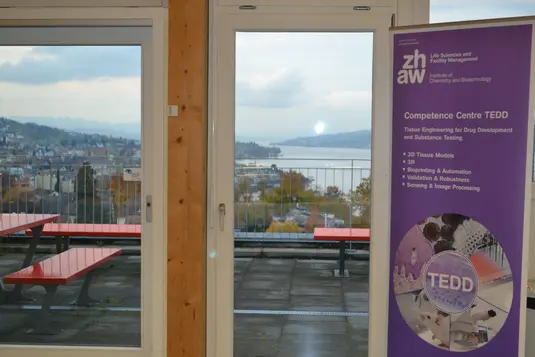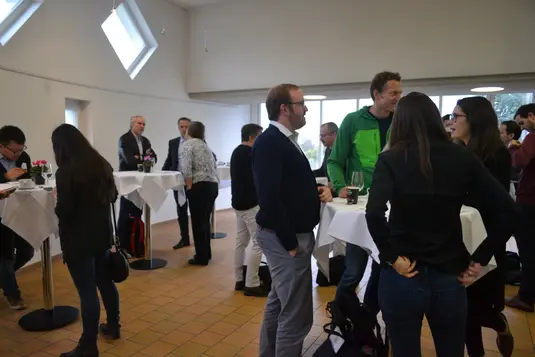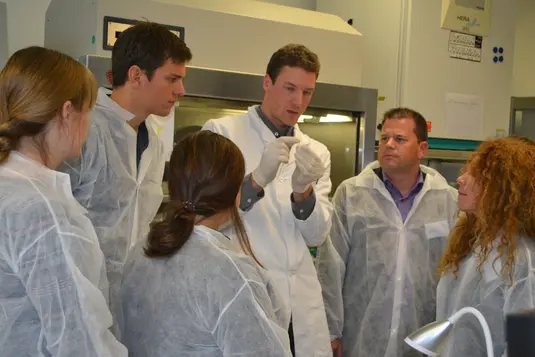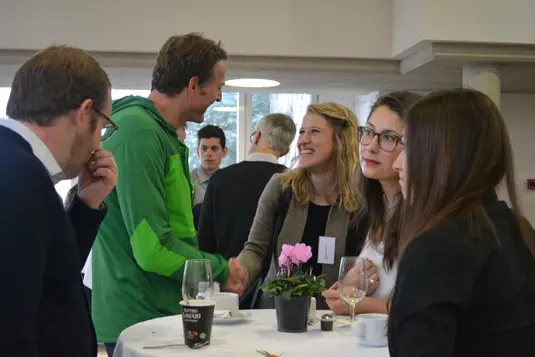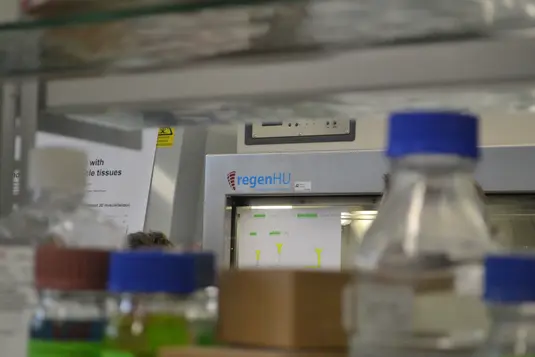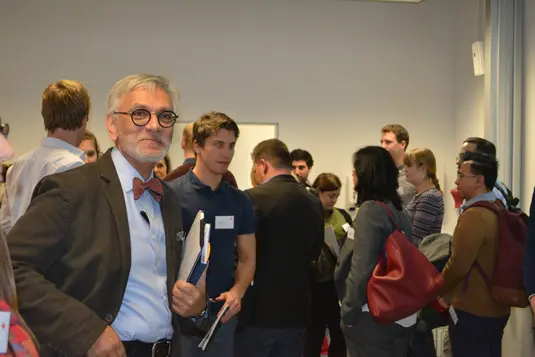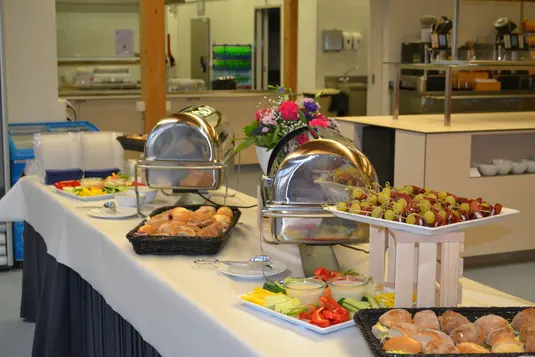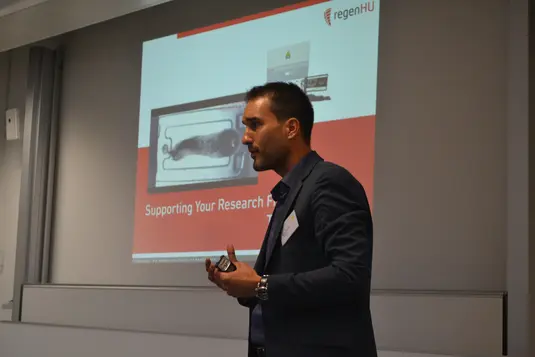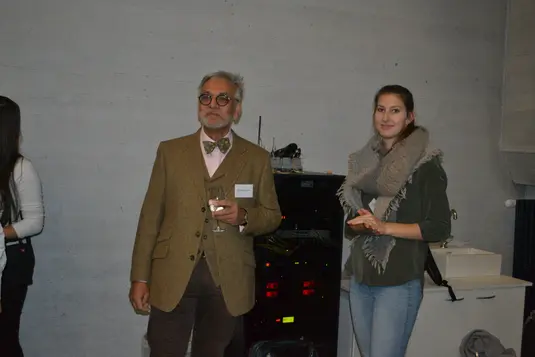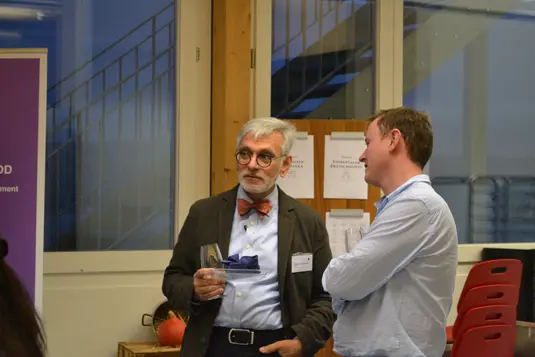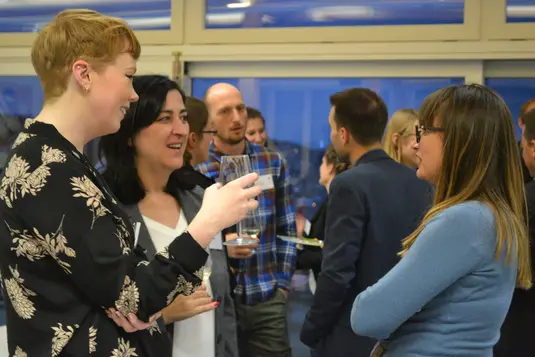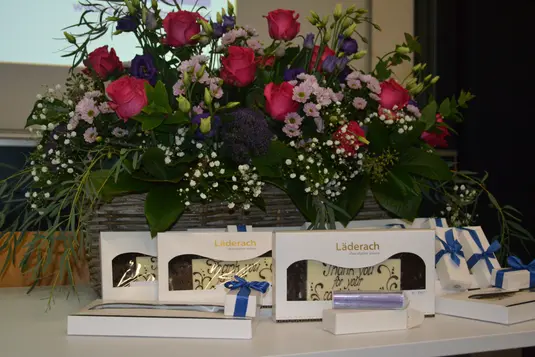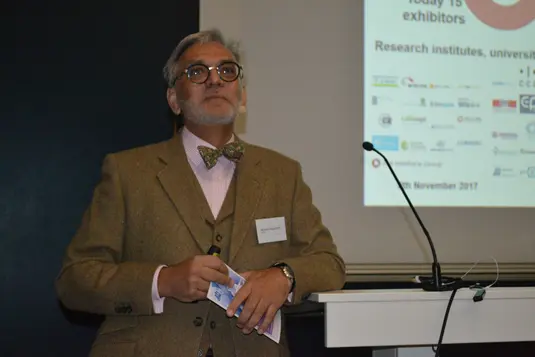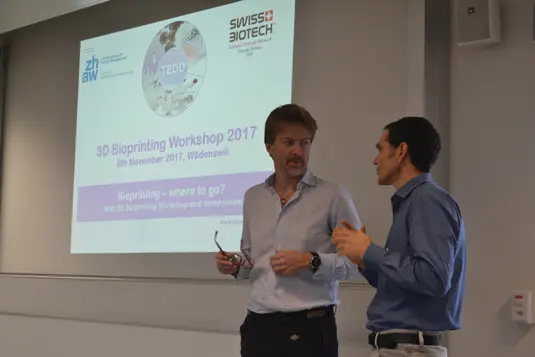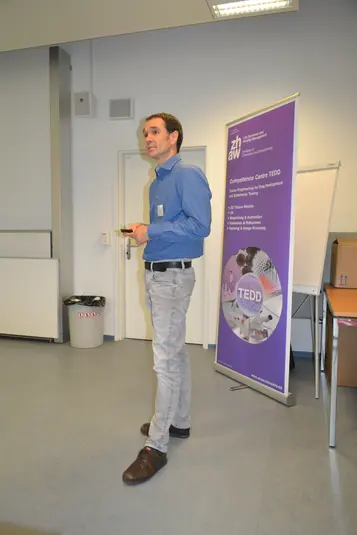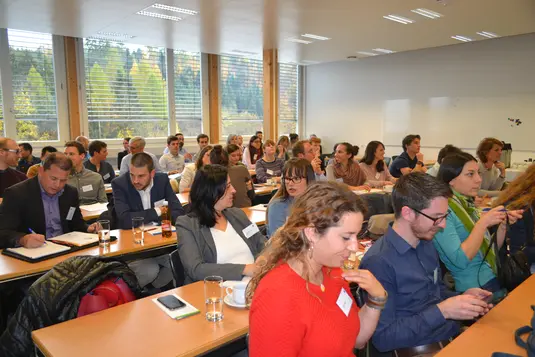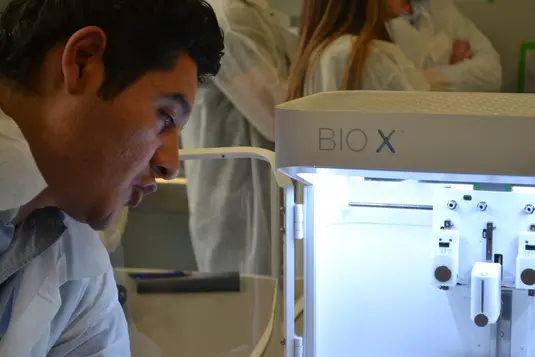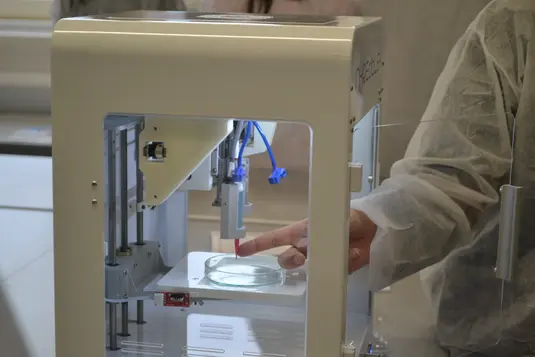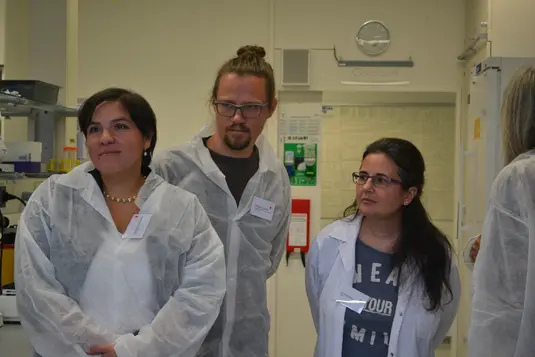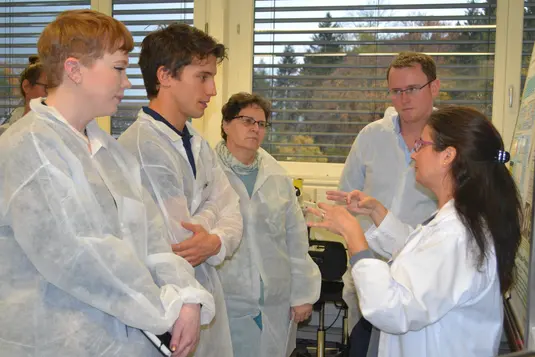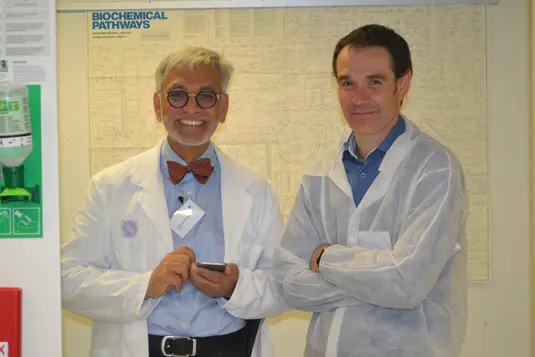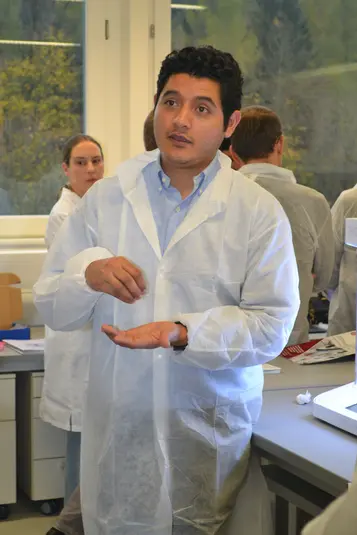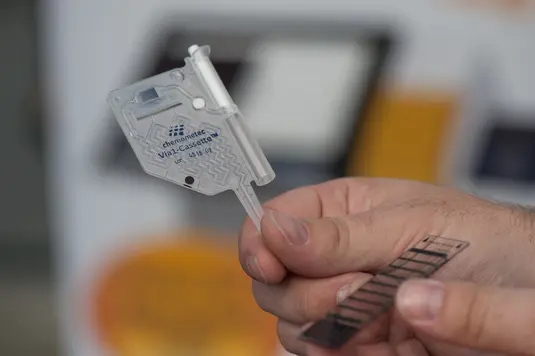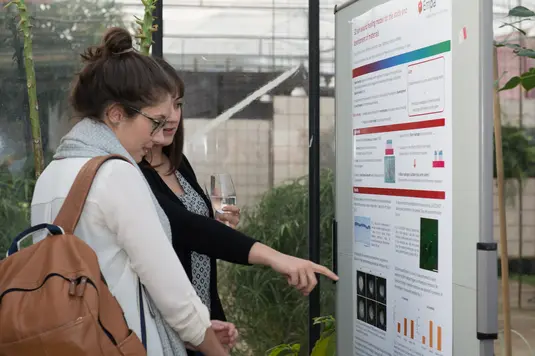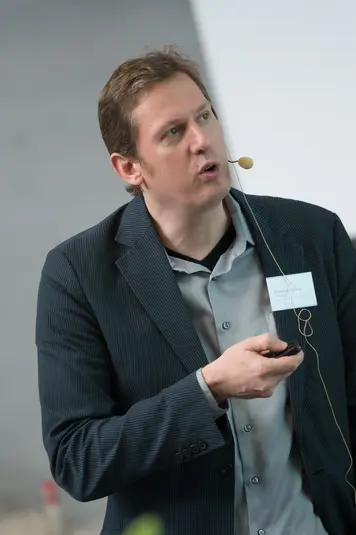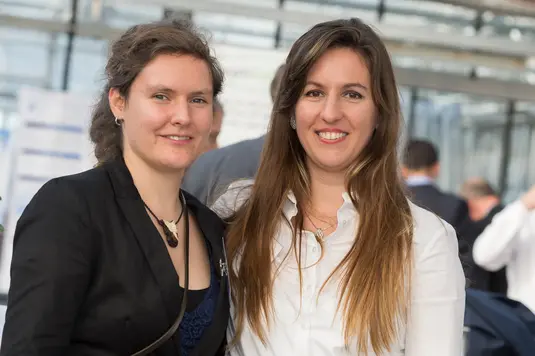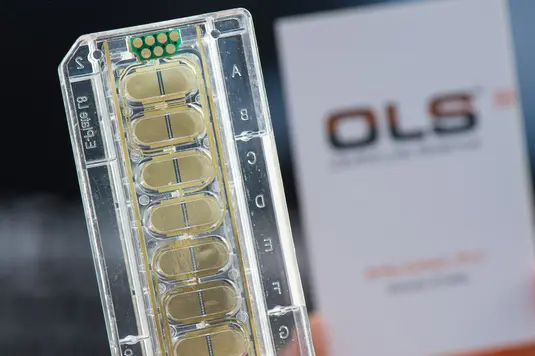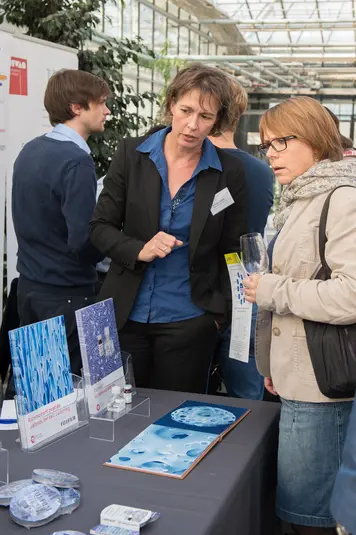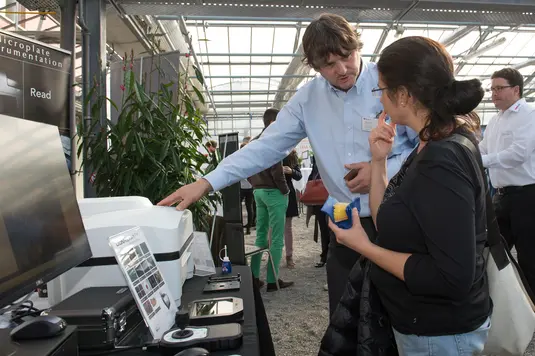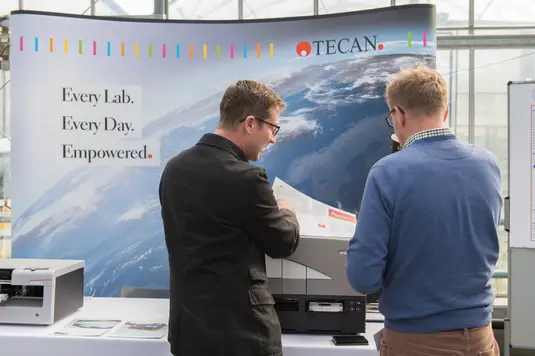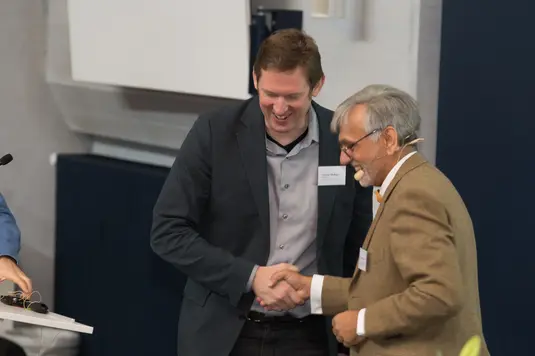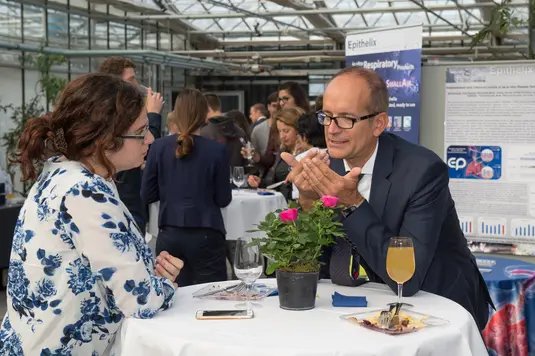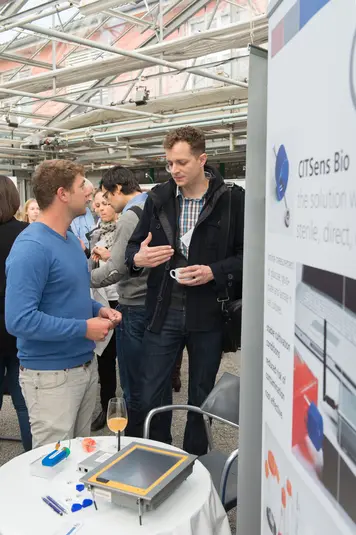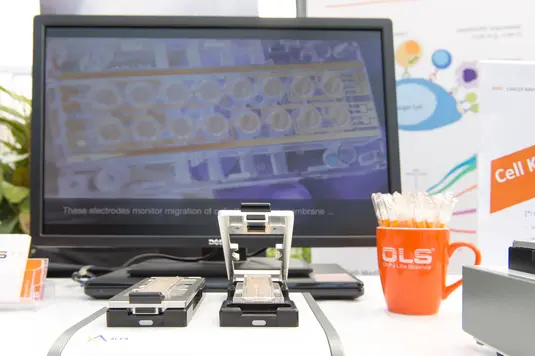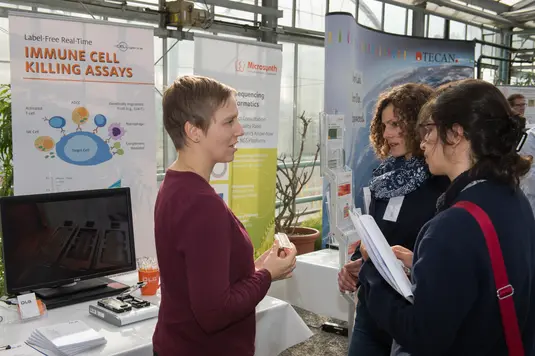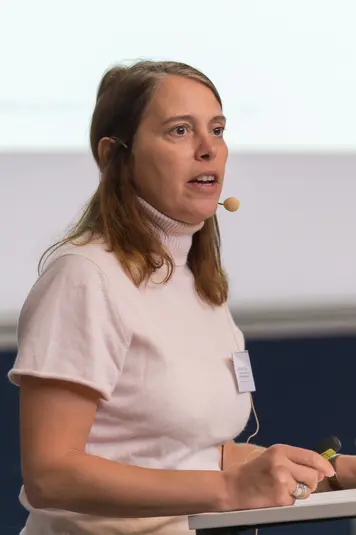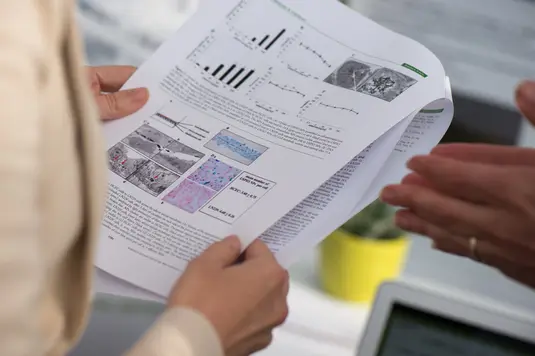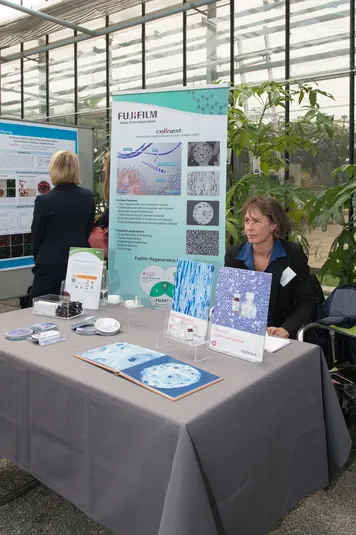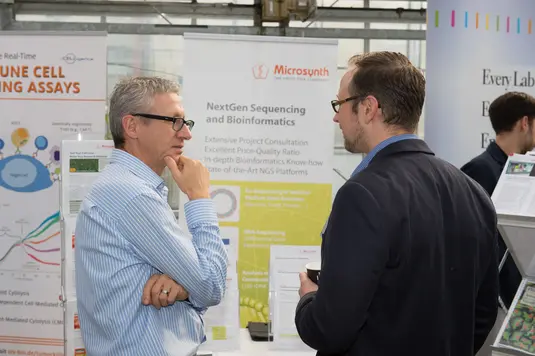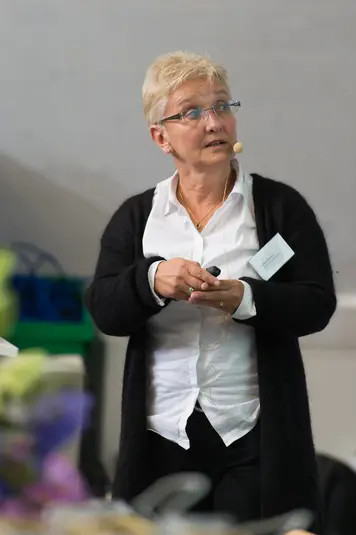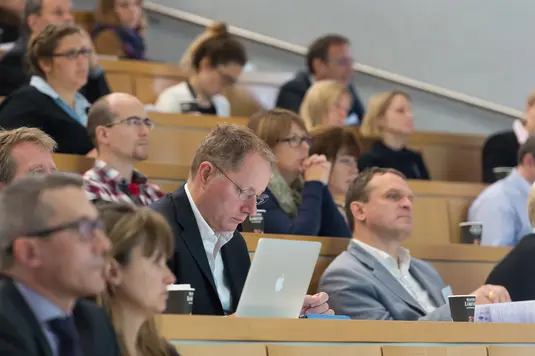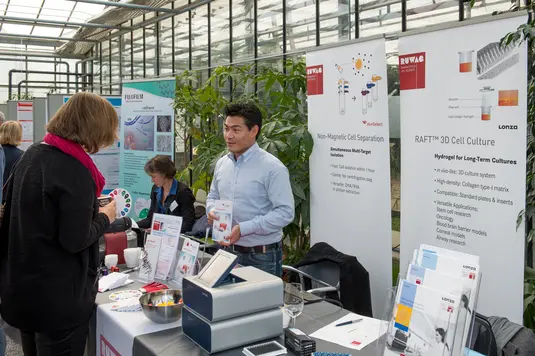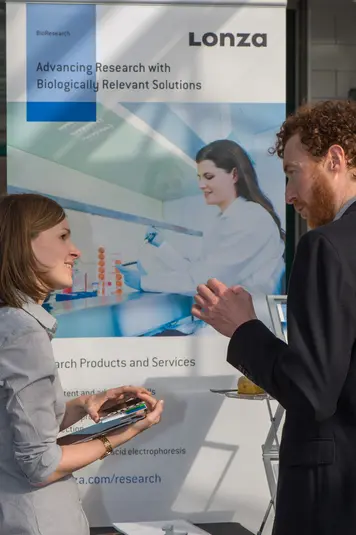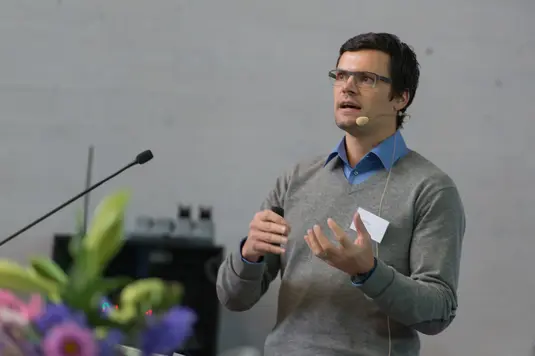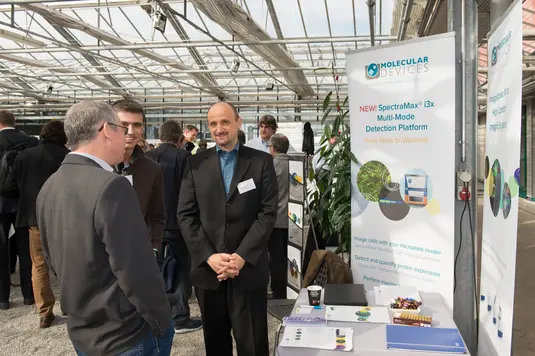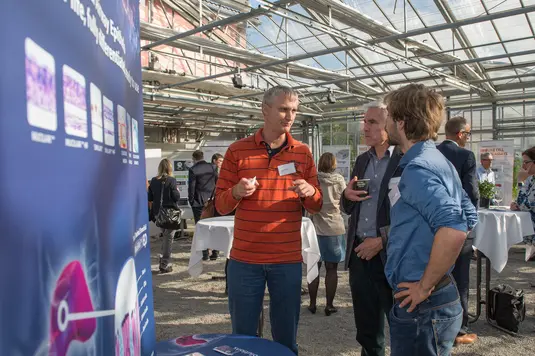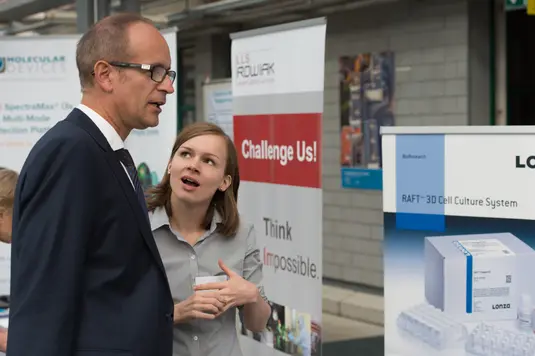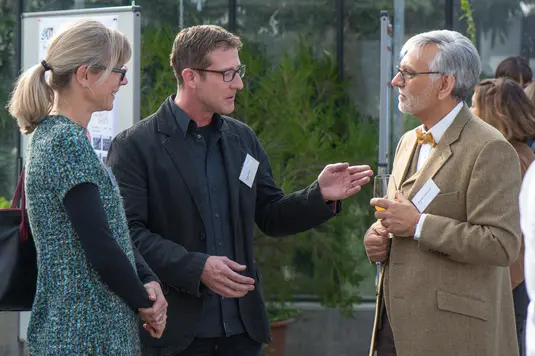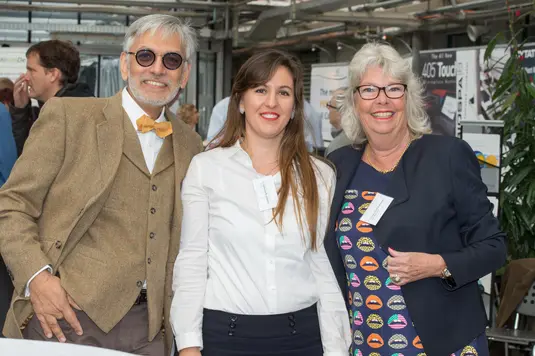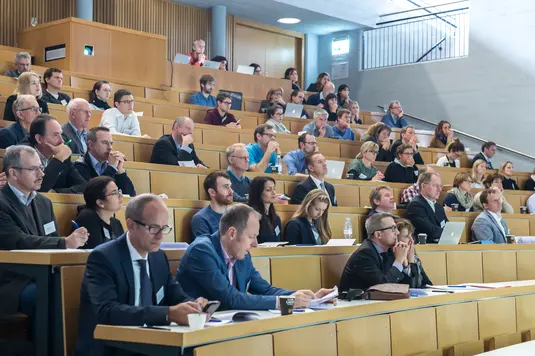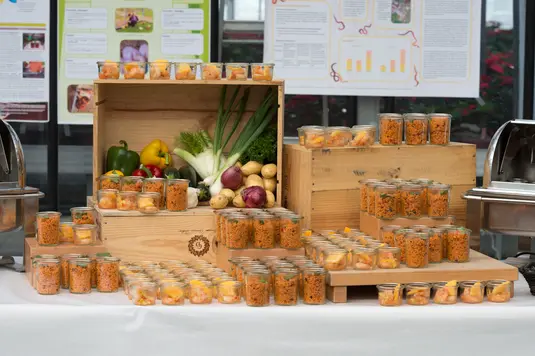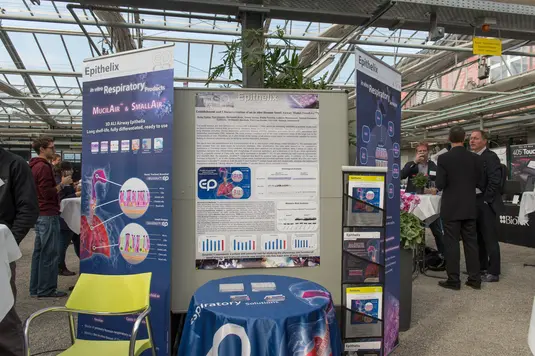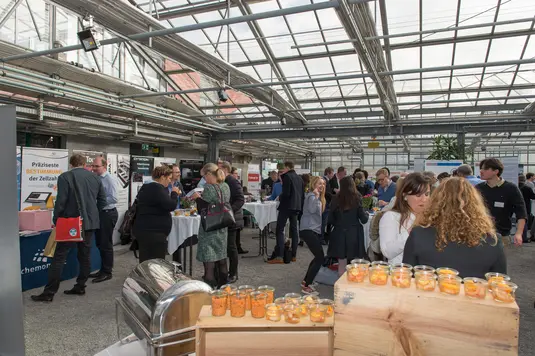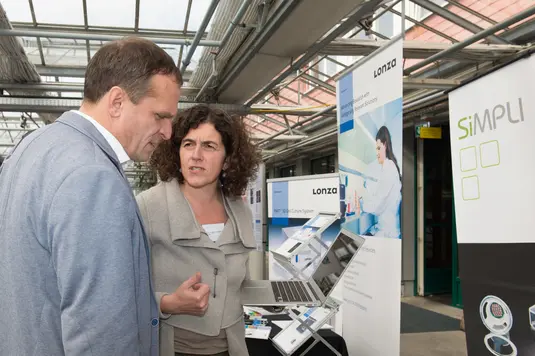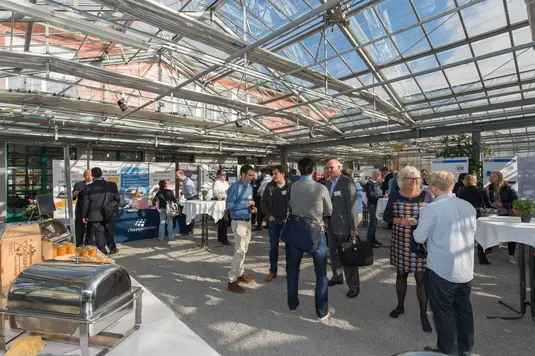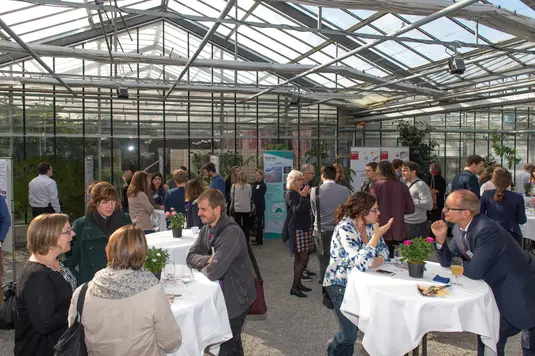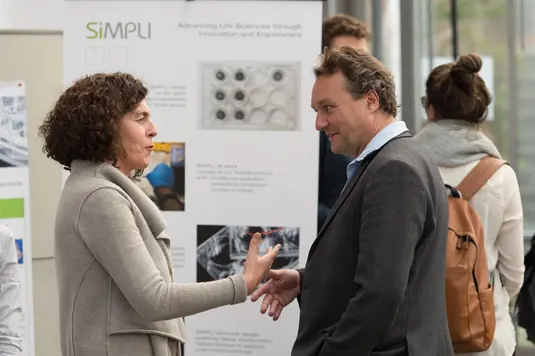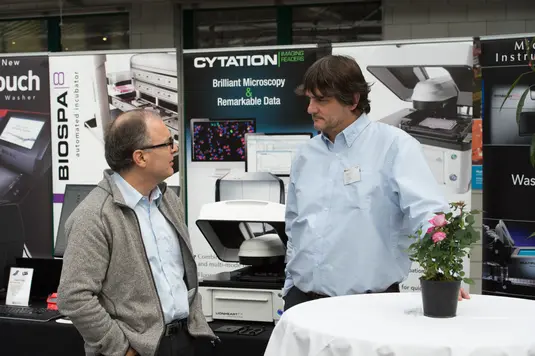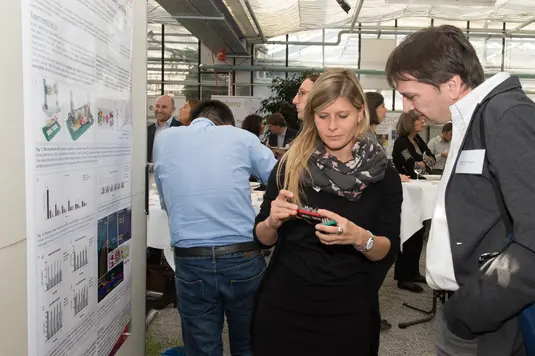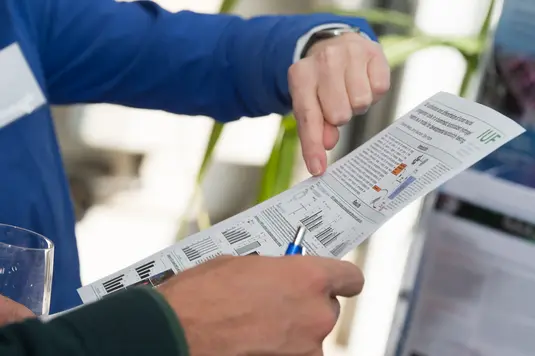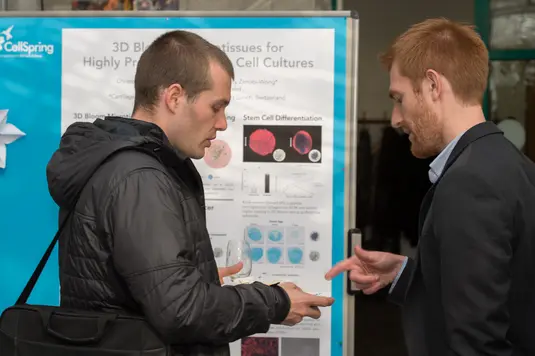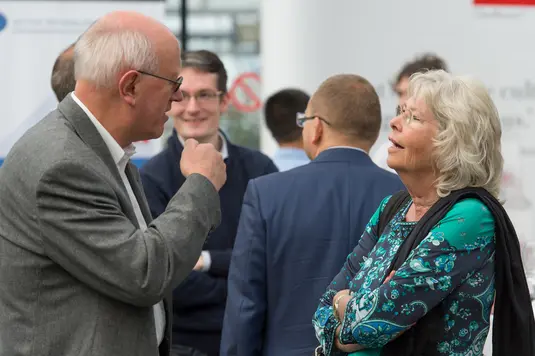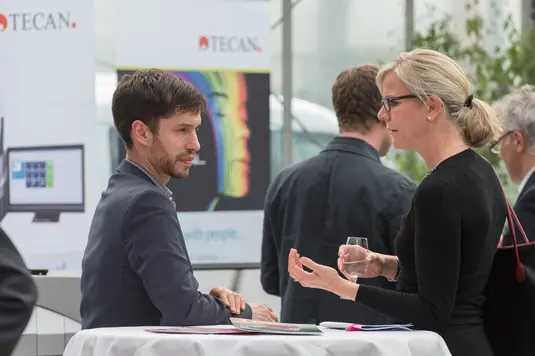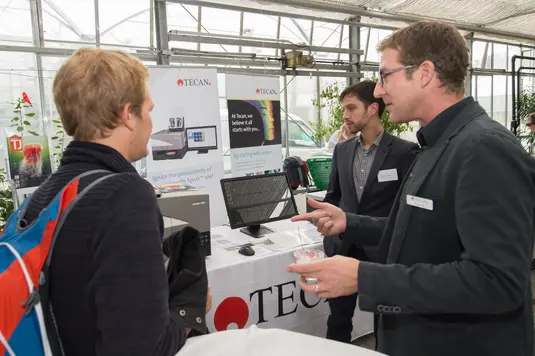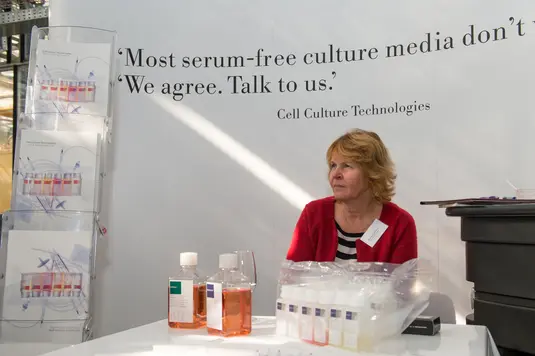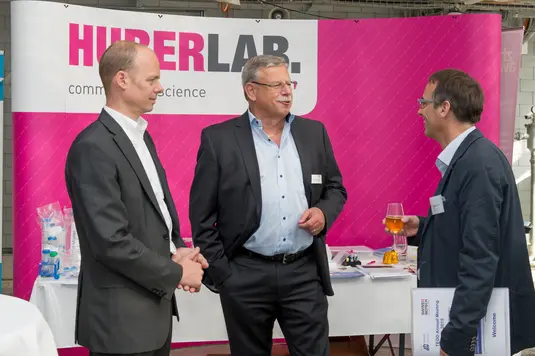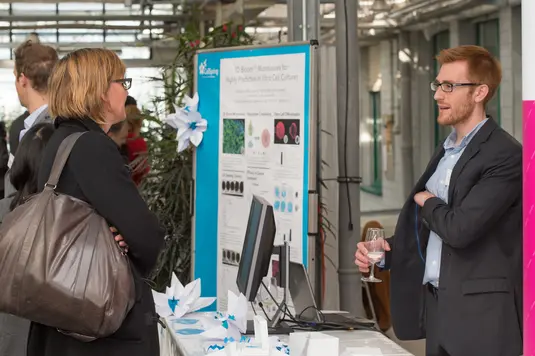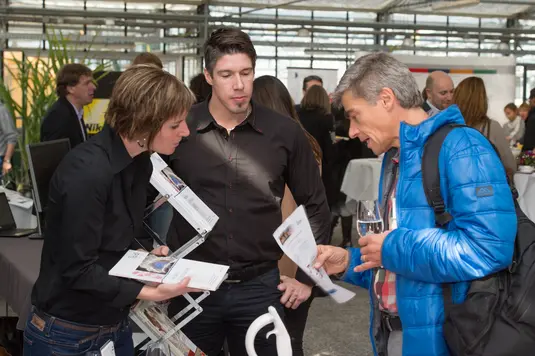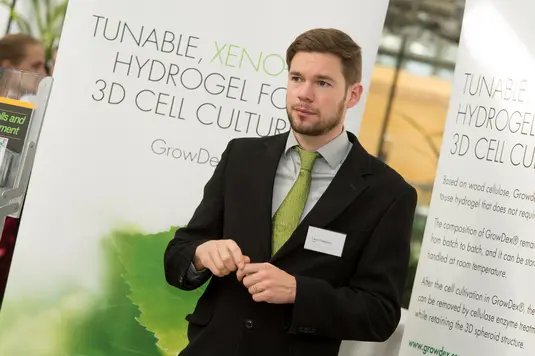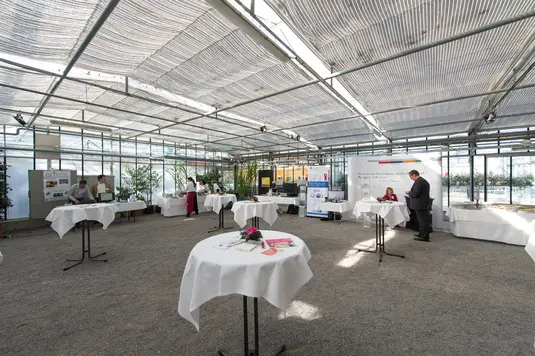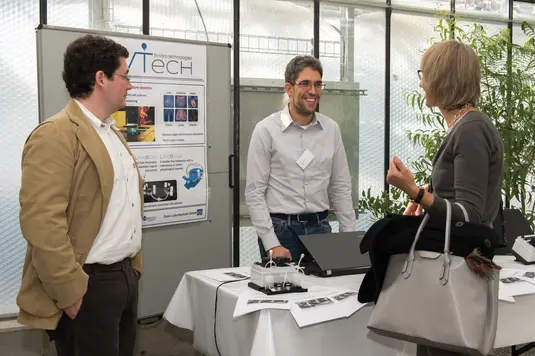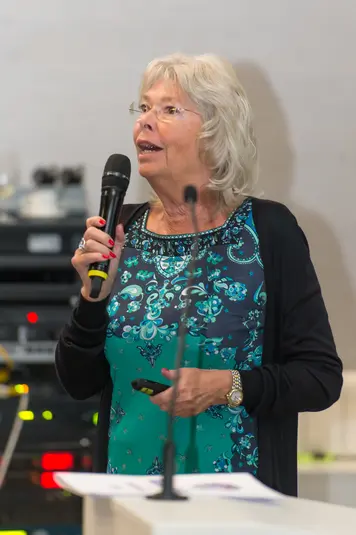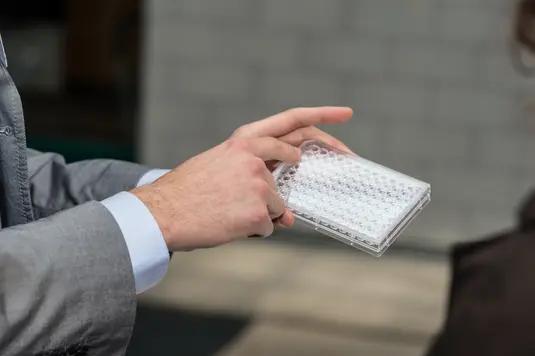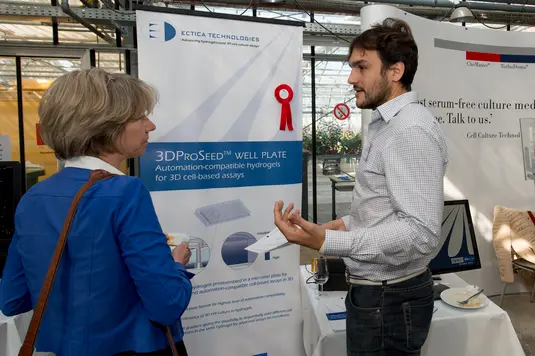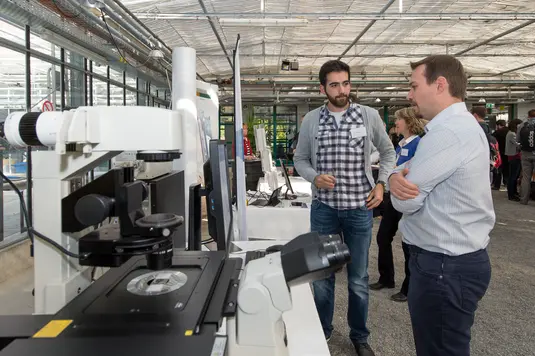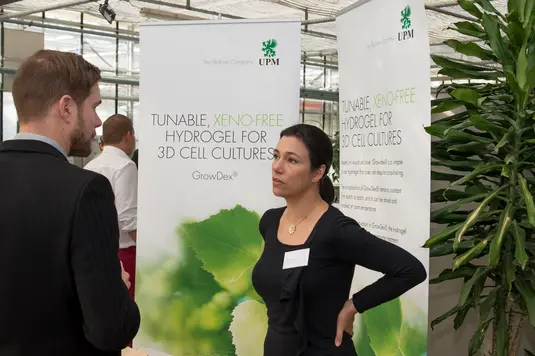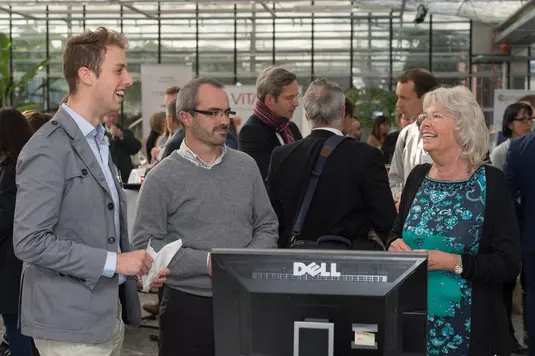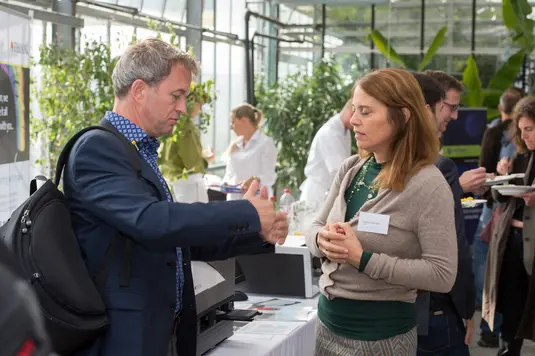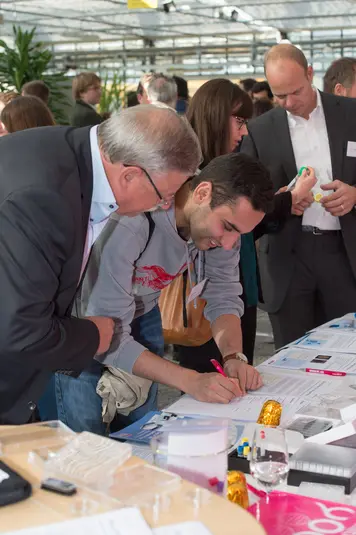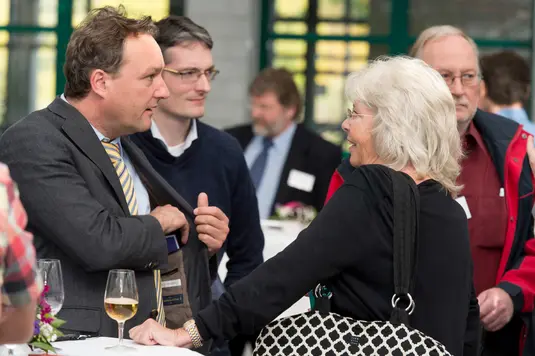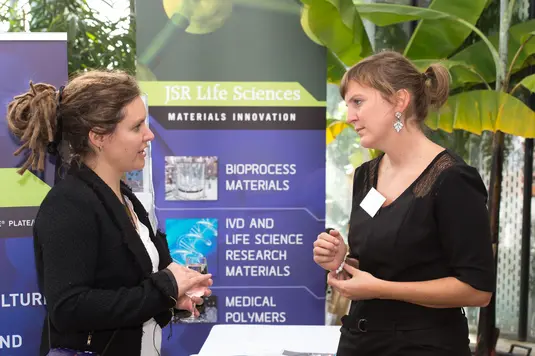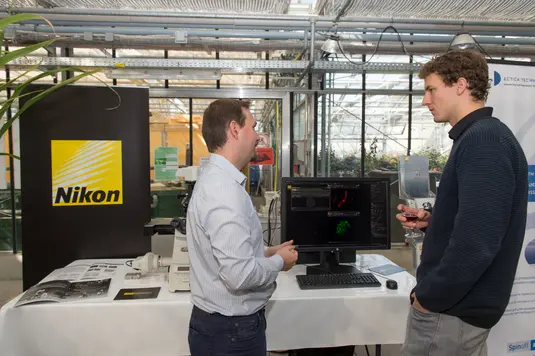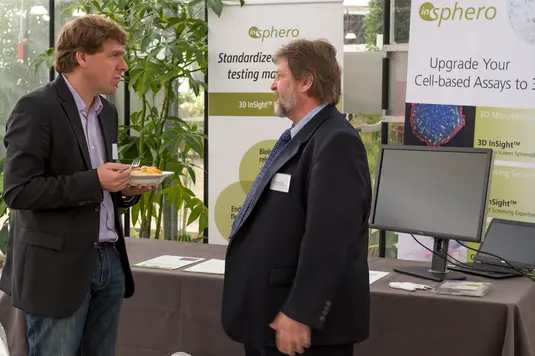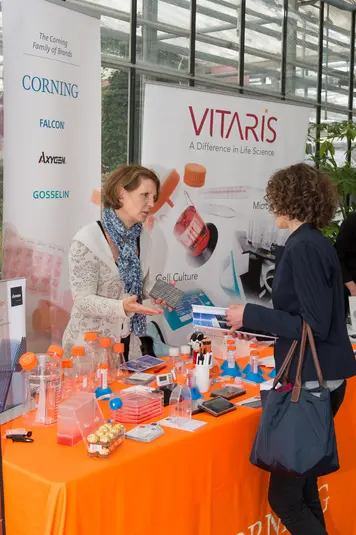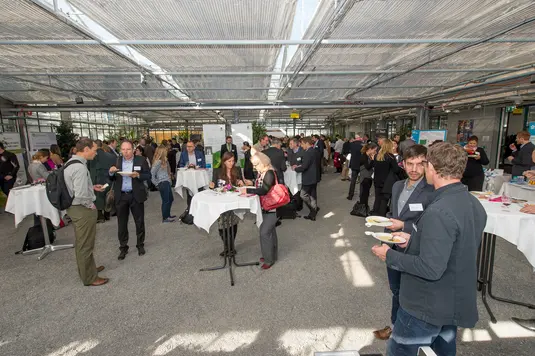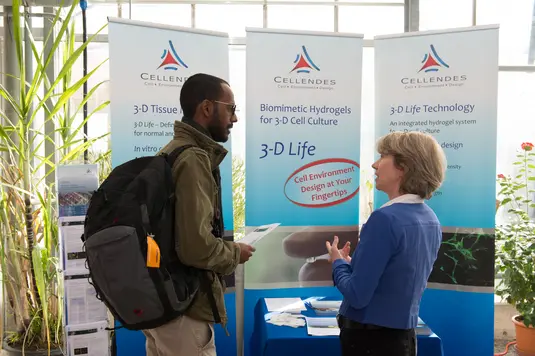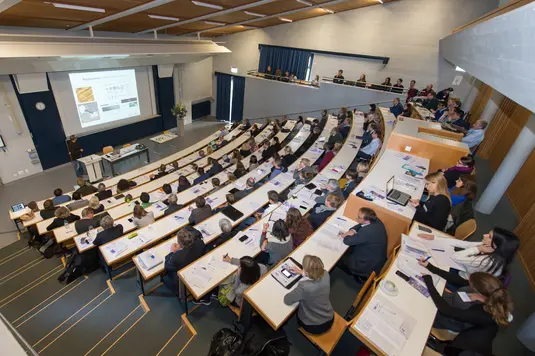Annual Meetings
Tissue Engineering for Drug Development and Substance Testing
TEDD Annual Meeting
2025: Advancing Biomedical Research with NAMs (New Approach Methodologies): Innovations and Applications in Switzerland
22 September 2025, ZHAW Wädenswil
New Approach Methodologies (NAMs) are transforming the landscape of biomedical research by offering innovative, ethical, and more human-relevant alternatives to traditional animal testing. These methods include advanced in vitro systems, organ-on-chip technologies, computational models, and the use of human-derived data. In Switzerland, a country known for its excellence in life sciences and precision medicine, the integration of NAMs is gaining momentum across academia, industry, and regulatory bodies. With strong institutional support and a commitment to the 3Rs (Replacement, Reduction, and Refinement of animal use), Swiss researchers are pioneering applications that improve translational relevance and efficiency in biomedical studies. As the global demand for more predictive and ethically responsible research methods grows, NAMs offer a critical pathway for scientific innovation and patient-centred progress. This conference will highlight the latest advancements, regulatory strategies, and collaborative opportunities shaping the future of biomedical research in Switzerland.
2023: Clinical applications of advanced cell culture models
8 th September 2023, ZHAW Wädenswil
During this year’s TEDD Annual Meeting, we will explore the clinical applications of advanced cell culture models and highlight their potential in revolutionizing biomedical research and patient care. We will delve into their use in disease modelling, drug screening, personalized medicine, regenerative medicine, and other emerging areas. By examining the current state of the field and discussing recent advancements, we aim to shed light on the transformative potential of these models in clinical practice and pave the way for future developments in this exciting field.
- PROGRAM (PDF 0.91 MB)
- PRESENTATIONS / Access for TEDD members only: contact info.tedd@zhaw.ch for password.
2022: Biointerfaces International with TEDD Annual Meeting, Zürich
13th - 15th September 2022, Zurich
This year BIC offered a program with a special focus on microphysiological systems, de novo tissues and organoids. We hosted more than 200 international participants, speakers from academia and industry, and 22 exhibitors. The BIC was preceded by the pre-conference seminar (BIS) that was well appreciated by young scientists.
2021: Cross-industrial applications of organotypic models
Recent advances in microphysiological systems (MPS) promise a global paradigm shift in drug development, diagnostics, disease prevention, and therapy. The expectation is that these systems will model healthy and various diseased stages and disease progression to predict toxicity, immunogenicity, ADME profiles, and treatment efficacies. MPS will provide unprecedented human-like physiological properties of in vitro models, enabling their routine application in the pharma industry and thus supporting reducing drug development costs by lowering the attrition rate of compounds.
Furthermore, we believe that promoting the cross-sectoral collaboration of academia and industry will further pave the way for widespread exploitation in precision diagnostics and therapy, disease prevention, and personalized nutrition. This will set a future-oriented alternative to animal testing, which is essential in the socio-political context.
During this TEDD Annual Meeting, we would like to showcase MPS application diversity across different industries. The aim is to foster the development of next-generation microphysiological systems (MPS) based on 3D cell culture, organoid, and organ-on-chip technology. To enable visionary projects and radical innovations, we will cover multidisciplinary fields and connect different industry sectors, like pharma, medtech, biotech, cosmetics, diagnostics, fragrances, and food, with each other.
DATE: 14 October 2021
PLACE: ZHAW, Campus Grüental, GA building, auditorium main building, Grüentalstrasse 14, 8820 Wädenswil
Access only for TEDD members: contact info.tedd@zhaw.ch for password.
PUBLICATIONS
2020: 10th Anniversary - 10 Years of Innovation in Tissue Engineering
The TEDD Competence Centre celebrated its 10th anniversary!
In 2020 we provided a new exciting format - the online conference on the platform Talque. We made the best out of the reality and supported the global efforts to recover from the COVID-19 pandemic.
The TEDD Annual Meeting 2020 was dedicated to cutting edge academic and industrial research. We focused on microphysiological systems (MPS) and its application in different fields, including research on the COVID-19 and the development of in vitro disease and infection models. The on-line event not only provided presentations but also allowed participants to network. Each participant had an opportunity to matchmake and request virtual 1-1 meetings. Additionally, we provided the exhibitors with the possibility to present their services and take part in virtual exhibition sessions over the “lunch break”.
DATE
22th October 2020
VENUE
Talque and Zoom
Access only for TEDD members: contact info.tedd@zhaw.ch for password.
PROGRAM
10:00 - 10:15 Opening of the Meeting, Dr. Markus Rimann, TEDD, Zurich University of Applied Sciences, CH
10:15 - 11:00 Keynote: Microphysiological systems - status of industrial adoption and regulatory acceptance for candidate decision making, Dr. Uwe Marx, TissUse GmbH, Germany
11:00 - 11:30 3D Human airway epithelial models to study SARS-CoV-2 pathogenesis, Samuel Constant, Epithelix, CH
11:30 - 12:00 Multiple facets of cerebral organoids for scientific research and drug testing, Dr. Sebastien Mosser , Neurix, CH
12:00 - 14:00 Virtual lunch break with Exhibition Sessions from 12:15-13:45
14:00 - 14:30 Engineering solutions for human pluripotent stem cells differentiation: from kidney organoid derivation to disease modelling applications, Dr Nuria Montserrat, Institute for Bioengineering of Catalonia, Spain
14:30 - 15:00 Breaching biobarriers: Human health risks of nanomaterials at and beyond protective biological barriers, Dr Tina Buerki-Thurnherr, Empa, Swiss Federal Laboratories for Materials Science and Technology, CH
15:00 - 15:30 Case studies to characterize exposure scenario-dependent chemical metabolism in a microphysiological system combining skin and liver organ models, Dr Jochen Kuehnl, Beiersdorf AG, CH
15:30 - 16:00 Closing of the meeting, Dr Markus Rimann, TEDD, Zurich University of Applied Sciences, CH
PUBLICATIONS
- Kopanska, K. S. and Rimann, M. (2021) “TEDD Annual Meeting 2020: 10th anniversary – 10 years of innovation in tissue engineering”, ALTEX - Alternatives to animal experimentation, 38(1), pp. 166-167. doi: 10.14573/altex.2012151
- Rasche Fortschritte mit 3D-Zellkulturmodellen tragen zu einer Zukunft ohne Tierversuche bei, ZHAW (in German)
- LinkedIn, ZHAW LSFM
2019: Cell Sources and Stem Cell Generation for Drug Development
TEDD Annual Meeting brings together experts from diverse fields with a shared interest in advanced 3D models.
Primary and stem cells are becoming important sources for the generation of organotypic tissue models used in many biopharmaceutical applications, regenerative medicine, disease modelling and drug discovery. They promise to revolutionize the drug discovery process at all stages, from target identification through to toxicology studies.
While primary cells by nature represent the native tissue most accurately, they usually have limited capacity to divide and thus need to be freshly isolated for each assay limiting their application. In contrast the ability of stem cells to generate physiologically relevant cells in limitless supply makes them an attractive alternative to currently used recombinant cell lines or primary cells. Emerging technologies involve the production of organoids from human pluripotent stem cells (hPSCs) and the use of organ-on-a-chip devices. These approaches are showing great promise for developing a more reliable, rapid and cost-effective process when compared with the current use of animal models.
The current challenges include routinely directing stem cell differentiation to reproducibly and cost-effectively generate pure specific lineages.
During TEDD Annual Meeting, we have discussed how stem cells have already been used in the drug discovery process and how novel technologies can be applied to attain widespread adoption of stem cell technology by the pharmaceutical and biotech industry.
DATE
24th October 2019
VENUE
Zurich University of Applied Science (ZHAW), Campus Grüental 8820 Wädenswil (Switzerland)
Access only for TEDD members: contact info.tedd@zhaw.ch for password.
PUBLICATIONS
Advances In Vitro Models Analysis, ALTEX
TEDD Annual Meeting 19: Über Stammzellen und «Organs-on-a-Chip», ZHAW
2018: Advanced in vitro models analysis
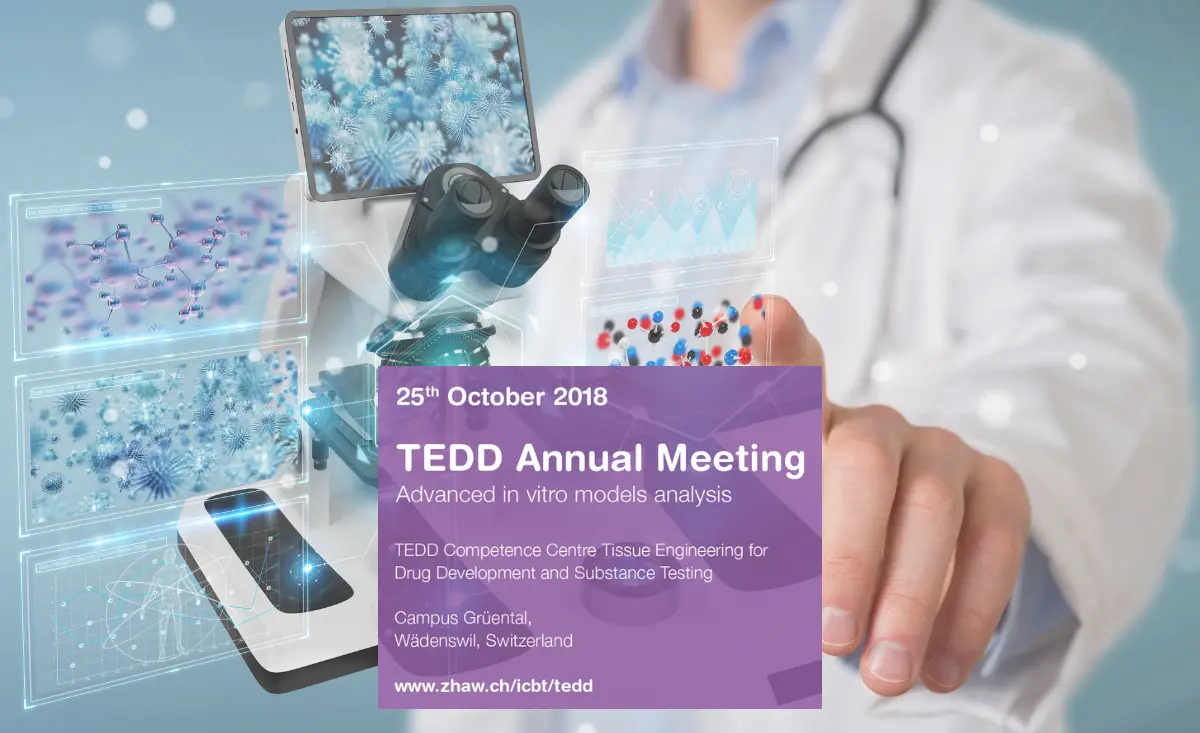
During the past two decades, we have witnessed significant scientificand technical advances in the fields of drug discovery and translational medicine along with advances in predictive in vitro model systems. As of now, microfabrication techniques and tissue engineering have enabled the development of a wide range of 3D cell culture technologies, including multicellular spheroids, organoids, scaffolds, hydrogels, organson-chips, and 3D bioprinting, each with its own advantages and disadvantages. 3D culture models have been penetrating into the early drug discovery process, starting from disease modeling to target identification and validation, screening, lead selection, efficacy, and safety assessment. However, challenges remain in standardization with respect to culture and assay protocols, phenotypes, and gathering output data for analysis. Assays using 3D cell models are far more complex and less developed with respect to imaging, analysis, quantification, and automation compared with established 2D methods. Improvements in imaging modality, data acquisition throughput, and analysis tools are necessary for the wide adoption of 3D cell cultures for screening. Regulatory authorities have yet to accept data obtained from 3D cell models, such as organoids or organs on-chips, as a surrogate for preclinical animal testing. This year’s TEDD Annual Meeting brings together experts from diverse fields with a shared interest in advanced 3D models. The idea is to help to foster collaborations between 3D cell culture developers, and experts in advanced analysis methods: microscopy, sensors, data modelling and high-throughput screening. Several companies will exhibit during our famously long lunch break at the Greenhouse, where we have the opportunity to interact. Join us for this meeting to celebrate another fruitful collaboration year with the new perspectives ahead.
The KVET association accreditated TEDD AM 2018 as worth 0.5-day continuing education. Participants interested in receiving the certificate should contact Dr Kasia Kopanska at kopa@zhaw.ch.
Date and location
- 21 October 2018
- ZHAW, Campus Grüental, Wädenswil

2017: Bioprinting-where to go?
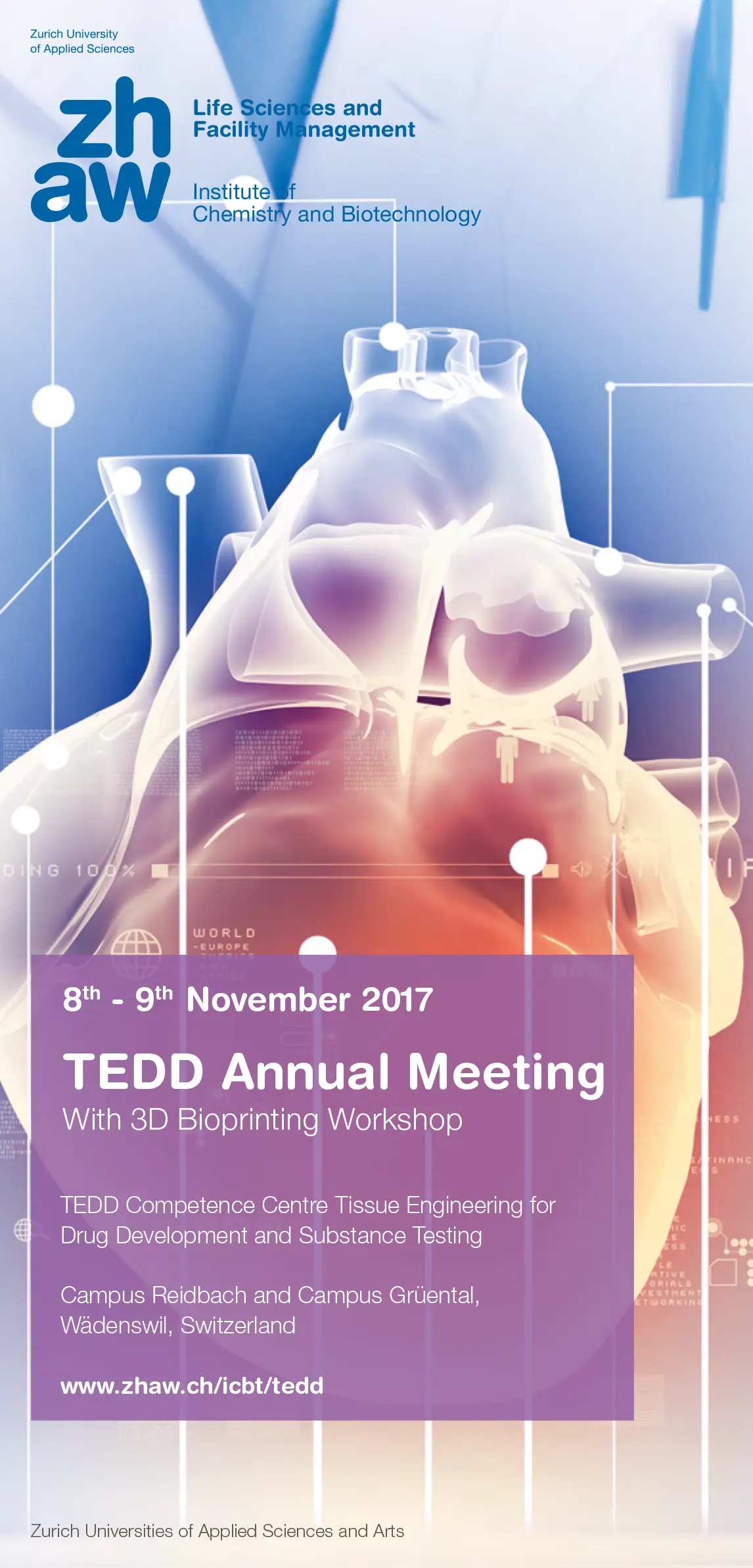
This year the TEDD Annual Meeting is dedicated to the field of bioprinting. The technology is expected to change the way we engineer tissues and bring it to a new level of physiological relevance. This will have an impact on drug development and substance testing, as well as clinical research and personalized medicine. We will hear about the latest developments of bioprinting in basic and applied research, as well as industrial applications. What are the benefits of bioprinting compared to standard tissue engineering approaches and where do we see a real added value?
As usual there will be an exhibition over lunch time, where industrial partners will present their latest technologies and ideas. This platform will enable discussions, collaborations and the generation of new network projects.
For the first time a workshop on bioprinting is preceding the TEDD AM where the two companies regenHU Ltd. and CellINK demonstrate their applications and collaborations.
Date and location:
- Workshop: 8 November 2017 (13.00 - 16.30), Campus Reidbach, RT 505
- Symposium: 9 November 2017 (full day), Campus Grüental, GA 203
Presentations (with password - request at info.tedd@zhaw.ch)
2016: 50 shades of 3D: from ultraflat 3D to recellularised organs. Harnessing the constructional and metabolic potential of human cells in vitro
Form follows function is a principle associated with modernist architecture and industrial design in the 20th century. However, considering contemporary tissue culture and efforts to render cell-based systems and complex tissue equivalents more physiological, the term function follows form would equally apply. Be it building connective tissue structures, or stacking cellular compartments allowing for crosstalk between different cell types - all these efforts have one goal: to emulate in vivo-like functionality. Part of this functionality is rooted in the spatial relationships between cells and connective tissue structures. Therefore, three-dimensional (3D) cell culture technology has emerged as one of the fastest growing experimental approaches in the life sciences. The 3D cell culture market is predicted to reach 1.35 billion USD by 2021 from currently 470 Million USD this year at a CAGR of 23.6% (marketsandmarkets.com).
This TEDD annual meeting highlighted current segments of the 3D cell culture market, namely scaffold free, scaffold-based, bioprinting, and the use of recellularised tissues. This year we shed some light on metabolic tissue engineering, namely the generation of human brown fat cells from progenitor cells. Brown fat was originally assumed to be present only in babies and small infants, but there is increasing evidence that adults have brown fat deposits to varying degrees. What makes brown fat so interesting is its capacity to become a fuel guzzler after activation, increasing the metabolic rate and burning calories.
The talks covered new technologies to empower cells to perform on a higher physiological level and receive the latest information about current activities in research and industry in the field. During the extended lunch participants had the opportunity for discussion and networking, and to visit our industrial and research partners’ exhibition, where they shared their latest ideas and technologies.
- Publication (PDF 1.20 MB)
- Presentations (with password)
- Photos (All photos are copyright. Please email us if you would like to use them.)
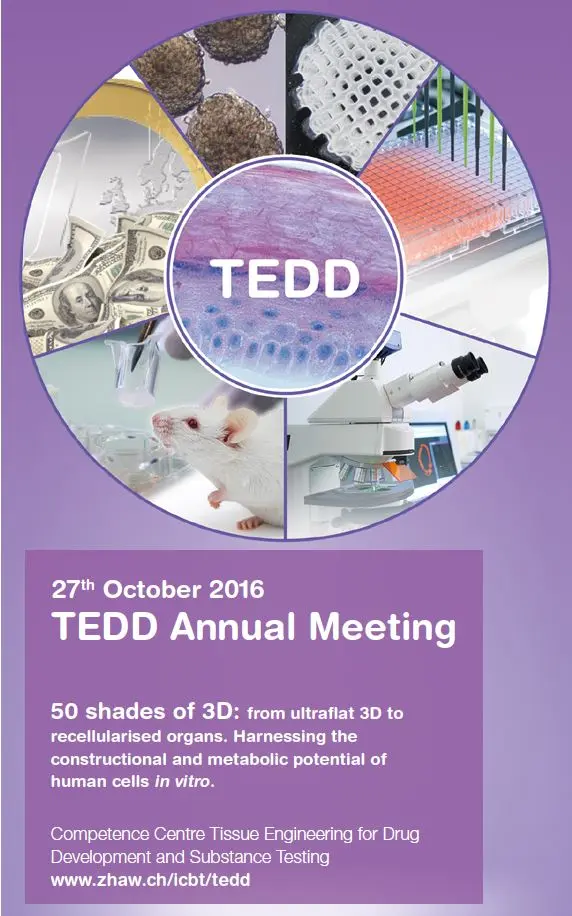
- Metabolic Tissue Engineering: a tale of two fats, Dr. Michael Raghunath, Head of TEDD Competence Centre, Zurich University of Applied Sciences (ZHAW)
- Regulation of brown fat formation and function, Prof. Dr. Christian Wolfrum, ETH Zurich, Department of Health Sciences and Technology, Switzerland
- Complex vascularized tissue models and their application, Prof. Dr. Heike Walles, Department Tissue Engineering & Regenerative Medicine (TERM, University Hospital Würzburg), Translational Center Würzburg, Regenerative Therapies in Oncology and Musculoskeletal Disease Würzburg, branch of the Fraunhofer Institut Interfacial Engineering and Biotechnology (IGB), Germany
- Human 3D-cocultures for the study of liver fibrosis, Prof. Dr. Laura Suter-Dick, University of Applied Sciences and Arts Northwestern Switzerland
- Adding metabolic competence to 3D cell-based assays using a spheroid-based microphysiological system, Dr. Olivier Frey, InSphero AG, Switzerland
- Fabrication of functional human skeletal muscle tissue for drug testing using 3D bioprinting, Dr. Hansjoerg Keller, Novartis Institutes for BioMedical Research, Switzerland
- Engineering human hair follicles in vitro – opportunities in regenerative medicine and cosmetics testing, Dr. Uwe Marx, TissUse GmbH, Germany
- Evaluation by 3D imaging of the molecular activity in pre-clinical phases, Dr. Jean-Michel Lagarde, imactiv-3d, France
- SiMPLInext SA - Hi-Fi in vitro. Delivering on the promises of permeable supports for tissue engineering, Dr. Silvia Angeloni Suter, CSEM & SiMPLInext, Switzerland
- Application of human cell culture techniques to create cosmetic stories, Dr. Fred Zülli, Mibelle Group, Switzerland
- Final remarks and TEDD next steps, Dr. Michael Raghunath, Head of TEDD Competence Centre, Zurich University of Applied Sciences (ZHAW)
2015: Moving 3D cell cultures from bench to practice
In 2010 the co-founders ZHAW and InSphero AG launched the TEDD competence centre with funding from the Gebert-Rüf Foundation (BREF 2010). In the past 5 years the TEDD network has established itself and successfully promoted 3D cell culture activities. Company visits, workshops and symposia with both industrial and academic partners have been organized and several network projects started using our platform. Currently, 8 network projects funded by the Swiss government are running successfully. For the future we have set our sights even higher: from 2017 to 2020 a consortium of 8 TEDD partners will receive federal project contributions to further develop and implement 3D tissue models for routine use.
Join our community to take the next steps! At the 2015 Annual Meeting you can hear what experts have to say and receive the latest information about current activities in research and industry in the field. During the extended lunch you will have the opportunity for discussion and networking, and also be able to visit our industrial and research partners’ exhibition, where they share their latest ideas and technologies.
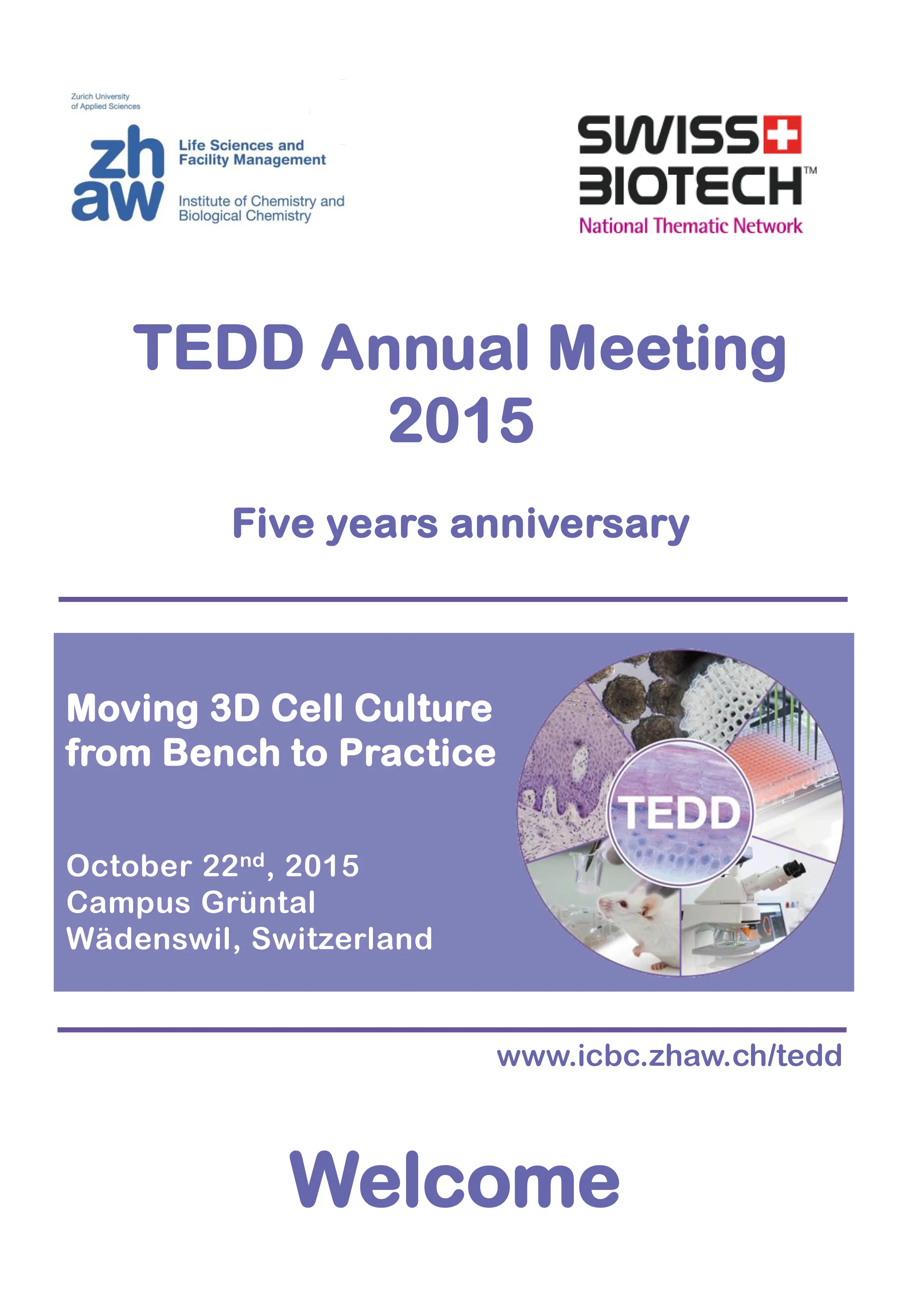
- TEDD Report 2015, Prof. Dr. Ursula Graf-Hausner, ZHAW, Head of TEDD Competence Centre
- Increasing biological relevance in vitro: From single microtissues to micro-physiological systems, Dr. Jens Kelm, InSphero AG
- Cell-instructive Polymer Matrix Platforms, Prof. Dr. Carsten Werner, Leibniz-Institut für Polymerforschung Dresden e.V., Max Bergmann Center of Biomaterials and Technische Universität Dresden, Center for Regenerative Therapies Dresden, Germany
- Potential of Macroporous Hydrogels as Biomimetic 3D Bone Marrow Analogs, Dr. Cornelia Lee-Thedieck, Karlsruhe Institute of Technology (KIT), Institute of Functional Interfaces, Eggenstein-Leopoldshafen, Germany
- Predictive 3D Lung Models for Inhalation Toxicology, Barbara Rothen-Rutishauser, Adolphe Merkle Institute University of Fribourg
- New 3D Biomimetic Hydrogel to Deliver Factors Secreted by Human Mesenchymal Stem Cells in Spinal Cord Injury, Prof. Dr. Giuseppe Perale, University of Applied Sciences and Art of Southern Switzerland SUPSI, Manno
- Multi-scale Functional Imaging of Tendon: Bench and Bedside, Prof. Dr. Jess Snedeker, University and ETH Zurich
- Simple Assays for Complex Biology, Dr. Christian Parker, Novartis Institute for BioMedical Research
- Parallel Preparation of RAFT 3D Cell Cultures on the Freedom EVO, Dr. Isabel Patocchi, Tecan
- Hyaluronic Acid Scaffold for 3D Cell Culture, Dr. Elise Demange, Celenys, France
- A Claim Substantiation for Resveratrol as an Inhibitor of Skin Pigmentation using Reconstructed Human Pigmented Epidermis, Dr. Remo Campiche, DSM Nutritional Products, Kaiseraugst
- Revolutionizing Organ-on-a-chip Technology: Any Throughput, Any Complexity, Anywhere, Dr. Jos Joore, Mimetas, Leiden, Holland
- Final remarks and TEDD next steps, Prof. Dr. Ursula Graf-Hausner, ZHAW, Head of TEDD Competence Centre
2014: 3D-cell culture with perspectives for medicine and animal welfare
A look back in the annual meeting of the competence centre for artificial tissue, drug testing and drug development - TEDD
Three-dimensional (3D) tissue culture gains in importance both in medicine and as alternative test systems for animal experiments. This growing interest was also confirmed by the third annual meeting of the Competence Centre TEDD (Tissue Engineering for Drug Development) at the Zurich University of Applied Sciences, Waedenswil Switzerland. The event established with 120 participants a new record.
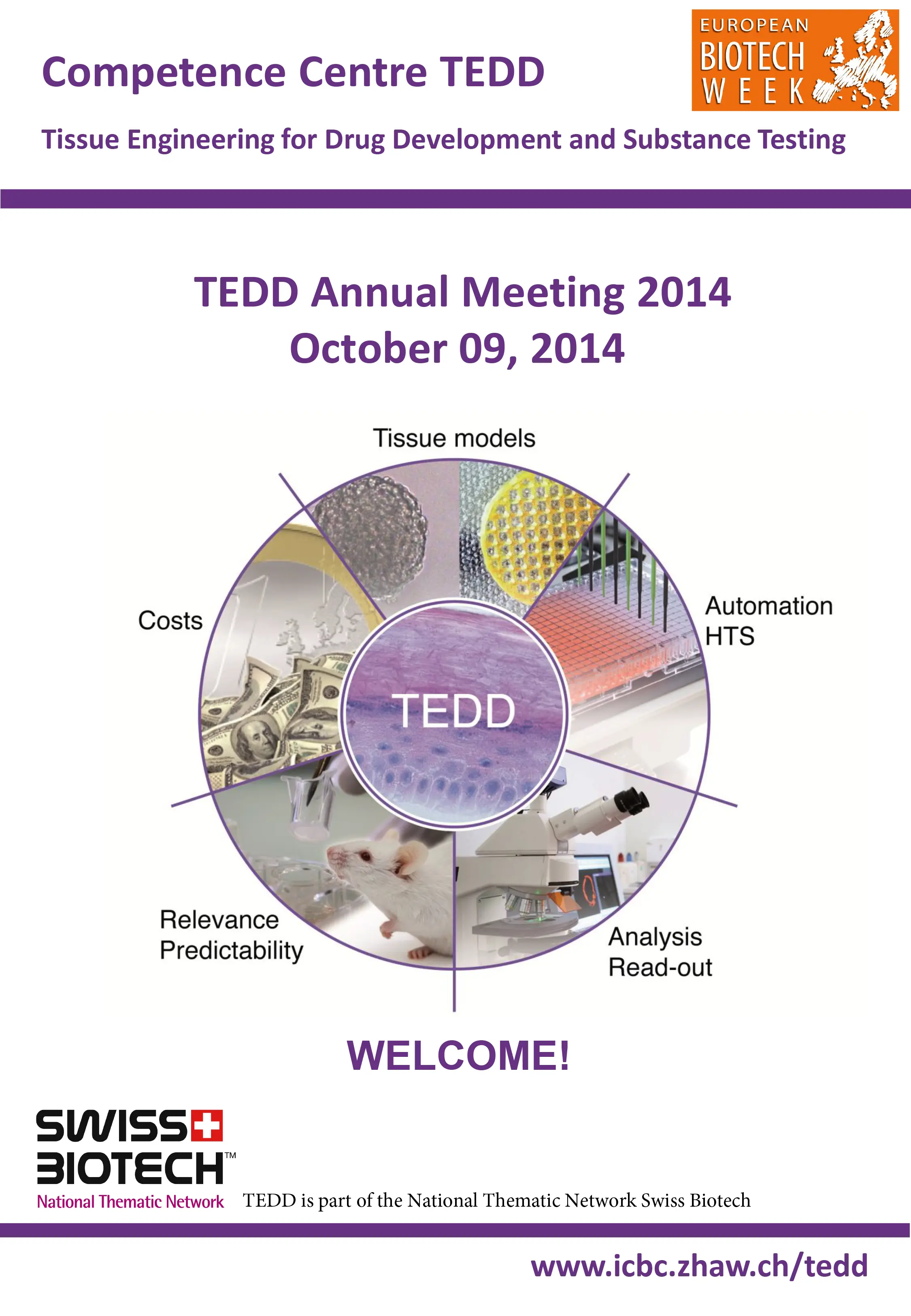
- TEDD and NFP information, Prof. Dr. Ursula Graf-Hausner, ZHAW
- Needs, dreams and reality about in vitro toxicology cellular assays for the pharmaceutical industry, Dr. Francois Pognan, Novartis Institute for BioMedical Research, Basel
- From basic research to clinically applicable skin grafts, Prof. Dr. Ernst Reichmann, Tissue Biology Research Unit, University Children’s Hospital Zurich
- Predicting therapy for the individual breast cancer patient using the tissue originated spheroid model, PD Dr. Barbara Mayer, SpheroTec GmbH
- 55 years of 3Rs: Where do we stand, where are we going?, Dr. Stefanie Schindler, Animalfree Research, Bern
- TEDD next steps, Prof. Dr. Ursula Graf-Hausner, ZHAW
2013: 3D cell cultures - a promising key technology for drug testing
A look back in the annual meeting of the competence centre for artificial tissue, drug testing and drug development - TEDD
About 100 participants from academia and industry discussed current developments and technologies of 3D cell culture. Highlights were the presentations of Prof. Dr. Ellen Fritsche from the Leibniz Research Institute for Environmental Medicine in Düsseldorf and of Dr. Martin Stelzle from The Natural and Medical Sciences Institute (NMI) at the University of Tübingen in Reutlingen.
2012: Pioneering research using human tissue models in drug development
A look back in the annual meeting of the competence centre for artificial tissue, drug testing and drug development - TEDD
At the center of the annual meeting of the ZHAW-competence centre TEDD from 23th October 2012, stood different research works in the field of tissue models which represent important tools for the development of new medicaments and evaluation of drugs. In addition, these tissue models could reduce the number of animal tests.
At the conference, 70 participants from academia and industry had the opportunity to be informed during demonstrations, on the results obtained in various network projects using human tissue models. It was possible to observe how a tissue printer works and how the flow of nanoparticles through the human placenta is investigated. Afterwards, the invited Prof. David Grainger from the Health Science Center of the University of Utah, outlined the future of this pioneering methods on tissue model with impressive examples.
- Competence Centre TEDD, Prof. Dr. Ursula Graf-Hausner, ZHAW
- Science and Industry: Realizing visions together, Dr. Oliver Peter, Acetelion
- The future of 3D cell culture in drug development, Dr. David W. Grainger, University of Uta























